#and unable to acknowledge the flaws of the other's environment/situation
Explore tagged Tumblr posts
Text
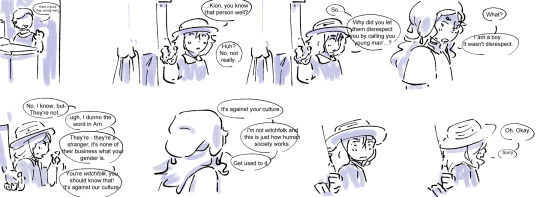
culture clash or something
#kion#hikaru#these two have a really interesting and also fucked up dynamic when they're younger i need to explore it more. the siblings ever!!!#they're jealous of each other's (initial) upbringing and seeing it as 'ideal' and the better childhood/environment#and unable to acknowledge the flaws of the other's environment/situation#on top of culture clash for hikaru and kio struggling with jealously/resentment and guilt over those feelings#so they accidentally set each others' triggers off all the time and don't understand why the other is upset Oops#they eventually reconcile and sort through their shit when they're older but like. adults older so not for a while#it's not shrimple at all..... in fact rather clamplicated......
11 notes
·
View notes
Text
*pulls up in AuDHD+anxiety+dyscalculia*
Not sure about that. Out of the quadruplets, the one who strikes me as being neurodivergent at all is Don, and it's not autism but ADHD.
But there are some other diagnoses each kid shows signs of:
Buddy Tyrannosaurus: Anxiety - Buddy is a very timid soul, especially at the start of the series. Unlike Tiny, who dives head first into everything, Buddy frequently shows fear when seeing the more dangerous features on creatures and trying new things. His anxiety is social as well. He admitted in one episode that he gets scared of meeting new people because he's scared they won't like him. And in an early episode, he's extremely self cautious about singing and dancing with Tiny and Don in public. As the series progresses, Buddy gets braver and braver. His confidence grows massively, and he is even willing to take risks, as seen in Adventure Island. But he still has anxiety even then, sometimes struggling with coordination as he tries to control the adventure island robots. He also frequently falls into bouts of withdrawal and deep thinking in the series related to his own inner insecurities, needing his family or a close friend to pull him out of his own head. Also, Buddy suffered from early developmental trauma, all fault of his biological parents leaving him and his adopted family being unable to figure out what species he was initially. All of that is bound to have had a lasting negative impact on him!
Tiny Pteranodon: Depression - We only see it in one episode really, Love Day, but dang that one episode! Tiny shows classic signs of depression. She's sad, she doesn't have the energy to do anything, she has no appetite, and she goes off to be alone to ride out her depressive episode. When her sister Shiny asks if she's okay and asks if anything happened to her, Tiny responds that she just feels sad for no reason sometimes, confirming that her depression may have chemical causes and that this isn't a one time thing. Curse season 5 being the last season!
Don Pteranodon: ADHD - My silly boi! Don just has neurodivergent vibes. Don has a processing speed that's a bit different than the other kids, is easily distracted and struggles to focus, and is shown to be clumsy. "Clumsiness" can often be a sign of neurodivergence via sensory processing disorder. Cough cough. I got that. The double sided coin of the spotty attention span, Don tends to hyperfixate as well on digging holes or expanding his collection.
Shiny Pteranodon: Anxiety - Like Buddy, Shiny gets scared of new experiences and people frequently - though even more than Buddy at times. She is unable to sleep well in unfamiliar environments, on multiple occasions, and struggles to muster the courage to face her fears - unless, of course, her siblings' well beings are involved, as seen in instances like her standing up to Keenan and being confrontational with a snake for stealing her siblings' toys. Shiny also feels the need to plan excessively and control the situation to keep things under wraps, which frequently comes out through her bossiness.
I really wish the series showed us more of Tiny's depression, and acknowledged Buddy's trauma in a more clandestine way. This poor boy has gone through so much! And the depression has so much potential weaved into Tiny's overconfident and reckless personality. That the show never acknowledges as character flaws.
Close rant/ infomercial.
all of the kids in dinosaur train were autistic
#dinosaur train#quadruplets#buddy tyrannosaurus#tiny pteranodon#shiny pteranodon#don pteranodon#buddy needs therapy#Buddy has anxiety#shiny has anxiety#tiny canonically has depression#AAAAAAAAAAAA THE UNREACHED POTENTIAL OF THIS SHOW#good thing fanfiction exists!
65 notes
·
View notes
Text
Let’s Talk About Norman
I’m going to start off by telling you all something you probably already know: Norman is abusive. I try not to use super strong language on this blog because calling someone abusive / toxic is a pretty big deal, but Norman is an abuser, full stop. Aside from the obvious physical violence though, there’s a lot of emotional trauma he causes Ruby through his actions— this post is mostly going to be talking about Norman’s emotional abuse and how it affects Ruby’s psyche and actions throughout the arc instead of just “oh he punched his son down some stairs” because I think it goes way deeper than that. With that out of the way, the rest of the post is below the cut!
PHYSICAL VIOLENCE
I can’t talk about Ruby and Norman without mentioning this— it’s the most clear cut evidence of his abuse on-panel. He punches his son down the stairs, engages in a high stakes fight with him, and puts him in mortal danger (which Ruby has to save himself from). What I’m concerned with isn’t the actual incidence of violence itself, but rather the emotional baggage that comes with it.
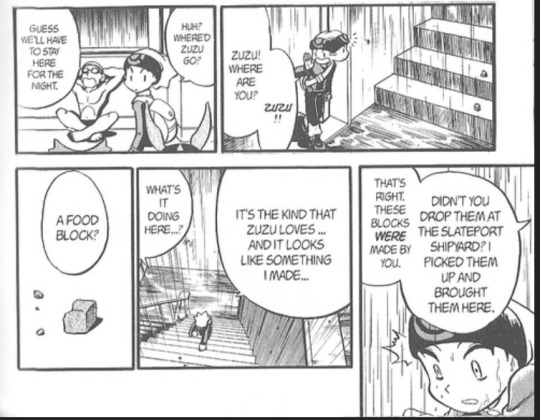
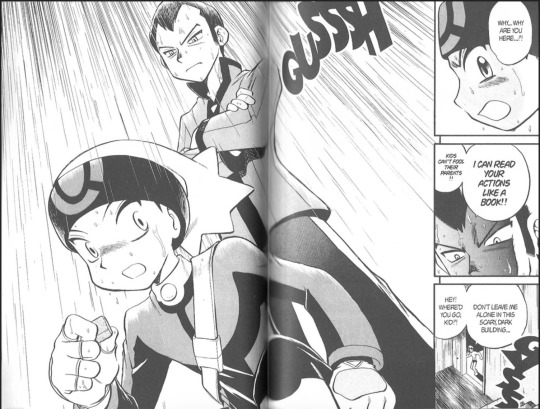
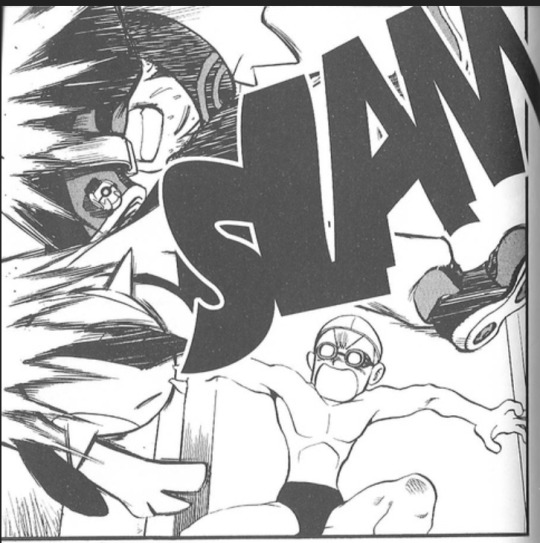
The interesting thing about the Big Fight scene to me is that Norman instigates the conflict. Norman lures Ruby into a “dark and scary building” in the rain and away from others, appears behind him, threatens him, and throws him against a wall. The only thing Ruby had done in that moment is ask his dad how / why he had found him— Norman was the instigator of violence. It is Ruby’s reaction to this immediately violent start that segues into the next Big Thing about their relationship.
ENVIRONMENT OF FEAR
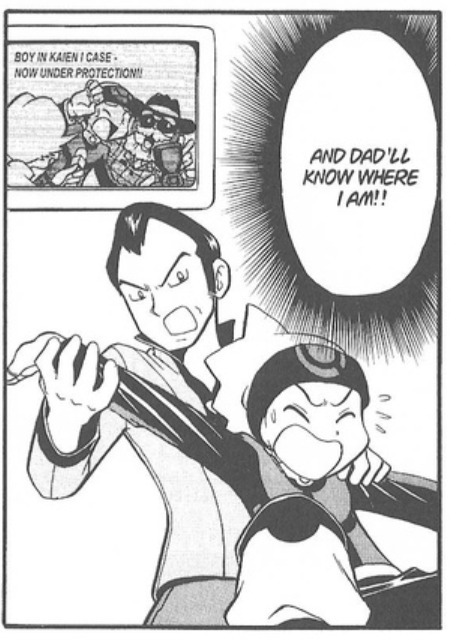
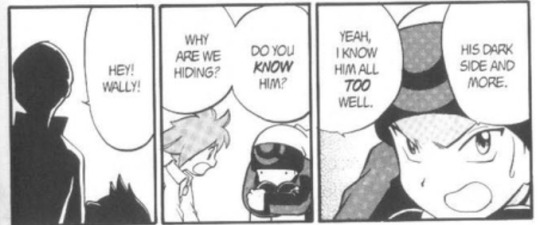
It is obvious from the minute Norman appears on panel that he is intimidating. Multiple characters throughout the arc mention that they are scared of / intimidated by him, but none are more obvious than Ruby. In fact until we reach the scene at the Weather Institute, Norman hasn’t been shown in a positive light at all from Ruby’s perspective. Ruby continuously mentions fear about his father: he imagines his father grabbing him, looking angrily at him, and generally seems to be afraid of him. Ruby expresses worry and concern about the consequences of his father’s anger— and that’s ALL he thinks about. Ruby mentions explicitly that he has seen “Norman’s Dark Side” and tries to hide as soon as he appears. He even shivers at the mere mention of Norman. Ruby’s entire motivation is his fear of his dad, which is bad, obviously.
Every thought about Norman that Ruby has up until the Weather Institute about Norman express fear and stress Norman’s emotional distance. Whether or not Ruby and Norman love each other is not of importance here, what is important is that Ruby has constant worry and anxiety about how Norman will react. His entire motivation at the beginning of the arc is centered around doing things behind Norman’s back and giving him definitive proof of Ruby’s accomplishments— Ruby is so nervous around Norman that he considers communicating to be a risk. This is typical abuse victim behavior and it continues through the arcs. Living under the constant threat of (often violent) punishment has taught Ruby that disagreements and communication in general are dangerous and can spiral into violence very, very quickly— he displays this same fear time and time again.
Quick Aside: As everyone here probably knows, the main conflict in the oras arc is centered around Ruby’s unwillingness to tell Sapphire what is going on for fear of how she will react. Ruby’s hiding of his memory of their confession in the Emerald arc is the same— Ruby refuses to communicate because he is afraid of how Sapphire will react. His main emotional flaw is the fact that he is driven by fear; Norman has shown him there are consequences to communication and Ruby carries this lesson throughout his entire life. He is a victim of abuse and this hampers his ability to communicate and be emotionally vulnerable. He is so caught up in the idea of consequences that he is more than willing to lie or omit the truth to avoid the consequences of talking to people about stressful topics. This is not to say that Ruby’s actions are excusable— he’s still a dick with communication issues, but whether or not Kusaka intended it, Norman’s abuse and its consequences define Ruby’s emotional arc.
ANGER ISSUES
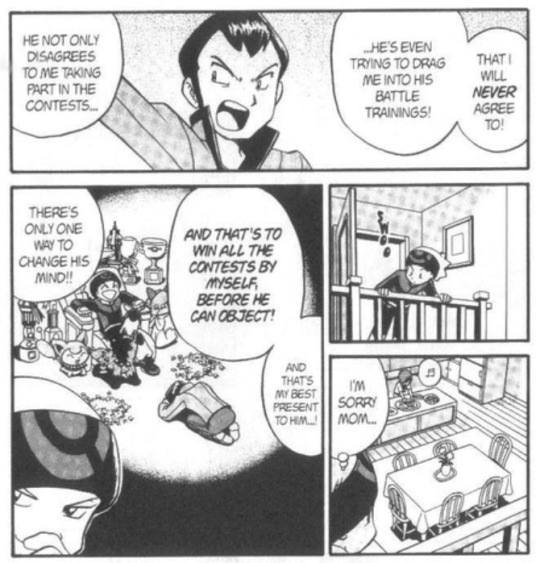
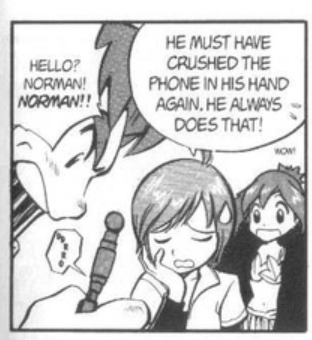
I can’t really talk about the environment of fear that Norman created without talking about his anger issues. He crushes a phone, shoves people out of the way, knocks multiple Pokemon out at once, and otherwise acts aggressively in various situations throughout the arc without any real Reason. As if these hints weren’t enough, we actually get confirmation through Ruby’s mother that Norman “does this often”— and judging by Birch’s reaction, these displays of destructive anger aren’t normal in in-universe. Whether or not there is a violent / strict parenting style within the universe doesn’t matter, because Norman is shown to be uncharacteristically aggressive in comparison to other adults in the series. Judging by Ruby’s reaction at the Weather Institute, he implies that his type of violence towards him isn’t uncommon; he seems almost resigned to it.
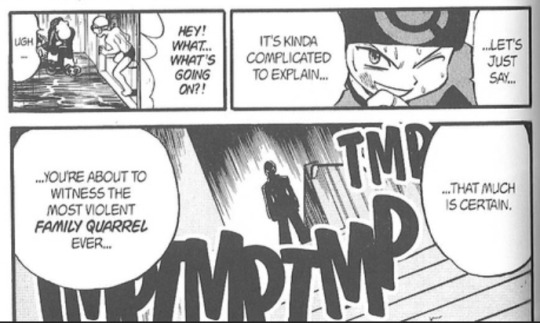
To wrap up this section: Norman’s aggressiveness is atypical even in-universe, he is shown to be unable and unwilling to curb his violent anger, and this creates an environment of fear among his family that permanently impacts Ruby’s ability to communicate effectively with others.
PART 2
DISCLAIMER: This is where things get… dicey. Everything I’ve mentioned previously is rooted in the actual drawings and actions of the characters or overarching themes / problems. This next part however focuses on dialogue. It is almost impossible to truly understand the tone of each line without being a fluent Japanese speaker (which I am not) so instead I’m going to use Viz and CY to the best of my ability for this section. I’m not going to extrapolate this to Kusaka’s intentions, since without the original work that’s nearly impossible, but I can at least talk about the way these come off in English.
EMOTIONAL ABUSE
Admittedly, Viz is the worst about this. They constantly hype Norman up and excuse his behavior, outright censoring some of the physical and emotional abuse. Viz absolutely mangling the tone of RS, however, is a post for another time.
Because Norman actually speaks to Ruby at length a grand total of twice times in the RS arc, we can break down his actions into these two instances: the first is at the weather institute and the second is as he’s dying.
Rather than go based on overall theme, this scene is best done line by line (this is using the CY version due to limited censorship compared to Viz).
Scene 1: Volume 17, Chapters 208-210
(Norman is dangling Ruby off the roof of a building by his collar. There are sharp rocks at the bottom)
Ruby: Re… release me…! Norman: Insolent brat!! Is that how you talk to your father?!
To start, Norman uses tone policing and deflection. He focuses on the fact that Ruby is “talking back” to him and making demands of his father, which doesn’t acknowledge Ruby’s request or the fact that Ruby is being dangling over the roof of a building. Also note that this is the first time the words are bolded and that they stay this way throughout the fight— Norman verbally escalates the fight. Norman is abusing his position of power over Ruby in order to excuse his actions and pass the blame back to his son.
Ruby: I don’t care how furious you are with me… I’m ready for it!
(Norman decks Ruby down a flight of stairs)
Norman: Why did you run away from home?!
Note once again that Norman is implied to start raising his voice first even when Ruby isn’t. There’s another deflection here: Norman changes the subject rather than actively respond to anything Ruby says.
Norman: Well? Say something! You’d better voice your complaints right now!!
(Ruby has a conversation with the Swimmer, who advises him to apologize to avoid his father’s rage and “just go home” which… fuck you Swimmer Jack. I’m skipping that part of the dialogue bc it isn’t that important).
(While Ruby is debating what to do, Norman’s Slaking lifts the stairs that Ruby is on and tries to fling him into next Tuesday).
Ruby is physically prevented from escaping by being dangled above Norman. I shouldn’t have to tell why physically preventing someone from leaving an argument is a bad thing.
(Ruby decides to fight Norman)
Note that Norman is physically and emotionally forcing Ruby into two possible options: Fight or be obedient. He is preventing Ruby from running and deflecting Ruby’s attempts to explain himself. He then shifts the blame to Ruby *again*, attacking Ruby and his pokemon with full force and implying it was Ruby who instigated the conflict in the first place.
Norman: … so you wish to fight me? … Iron Tail and Hyper Beam… I was the one who taught you those attacks. There’s nothing about your attacks and strategies I don’t know about. You’re just wasting your time! Give up!
Here, Norman does two things: he stresses Ruby’s dependence on him and his power over Ruby. It’s a typical “your success is dependent on me” and a “there is no option except obedience” rhetoric, and is likewise typical of abusers. Norman is stressing the things Norman has gifted to Ruby (battling knowledge) and using whatever he can to force Ruby to do what he wants— he’s exerting his control.
(Ruby turns the tide of the battle, so Norman likewise switches tactics by attacking Ruby himself and attempting to hit him with a staircase. Ruby falls down the stairs and is dangling over a pit of spikes when Norman stands on the edge, blocking Ruby’s only escape route).
Norman: Now will you come quietly? Stop being so stubborn
Not only is Norman forcing his son to choose between obedience and Literal Death, he also shifts the blame again. He excuses his own actions by claiming it is Ruby’s stubbornness that forced him into this position. He deflects the whole “putting my 11 year old in harm’s way” by claiming Ruby’s own resistance to Norman’s violence is the trigger for the violence itself. It doesn’t make sense, but it’s victim-blaming nonetheless and sadly, it works
(Flashback time: Norman admits he was going to give Ruby permission to participate in contests and gets emo about it. They fall, but Norman catches Ruby. This doesn’t matter though, because they both end up falling and Ruby uses his running shoes to save them both).
Ruby: (thinking) Ru- running shoes… my birthday present from dad… saved both… our lives
Ruby displays pretty typical abuse victim behavior here, focusing not on Norman’s 3 threats to literally kill him but instead on the One Good Thing Norman did. He doesn’t mention that it was Ruby himself who saved them both or that Norman was the one who put them in danger in the first place— he’s in total denial about the severity of everything that happened.
(At this point, Norman looms above Ruby with an angry expression and a raised pokeball. Bystanders panic because it appears that Norman is going to attack Ruby who, by the way, is unconscious on the ground, but Norman gets a surprise call from Winona and turns away after realizing that Winona can see him).
“I only stopped attacking my son when I realized people were watching”… alright fuck off then Norman
Norman: HEY!! Idiot son! You disobeyed your parents, then you ran away from home. I’ve had enough! Just do what you want! In return, you’d better accomplish your goals!! A man should complete what he has set out to do… … before he can return home!!
Hoo boy. Norman never apologizes, deflects all the blame onto Ruby, insults him twice, and then tries to save face with Winona and the people around him by giving Ruby permission to do contests— which he was apparently planning to do all along. He emphasizes the things Ruby did in response to Norman’s actions (Ruby ran away from home because he knew his dad would be unsupportive and gets violent during disagreements, so in essence Norman is to blame for backing him into a corner). Norman twists the narrative in order to make Ruby the instigator in every case, justifying Norman’s responses as reactions to Ruby’s problematic behavior
Swimmer Jack: Isn’t that a wonderful father? Ruby: Thank you… father.
Ok first of all Jack is a dumbass, so jot that down. Second of all, while it’s unintentional, Ruby is being gaslit to hell and back. It is only after Norman’s omission of all the abusive behavior and bystanders’ affirmation of Norman’s love that Ruby starts to think positively towards his father. The threat Ruby used to think was so large has been downplayed and outright denied by the people around him, so Ruby’s prior fear of Norman diminishes. Ruby’s fear of Norman and the violence Norman took against him is denied, downplayed, and ignored, so Ruby begins to doubt his own animosity towards his father. Thanks Swimmer Jack you unintentionally gaslit an 11 year old.
SCENE 2: (this one is much shorter, thank god)
(Norman, while he is dying, explains the whole deal with how he was ordered to search for Rayquaza yada yada. Throughout the exchange, Ruby gets increasingly upset).
Ruby: (thinking) barred from the test and forced to search for Rayquaza… It must be some kind of punishment! What could Dad have done to warrant such… why was he made responsible… ?!
Ruby: … … but… come to think of it, dad is not someone who makes mistakes easily… something’s not right!
Slight aside, Ruby has been so convinced of his father’s power by others that he is unwilling to even CONSIDER that his dad fucked up, which… wow!
Ruby: That day… Dad must have taken the rap for someone else… and… (flashbacks to Salamence Incident) that person… was….
Ruby: (out loud) … me?! That person who set Rayquaza free… was it me…?!
Norman: Yes.
And then he dies!
(Technically he says “oh I did all that out of love” (paraphrased) and then dies but it’s just a continuation of the previous thing).
Norman, before dying, does not say “I’m proud of you” or “I’m sorry for everything” or anything remotely comforting, instead he says “hey Ruby, you’re responsible for my death and all your childhood trauma alongside your friend’s. Peace.” (this is paraphrased).
Even on his actual deathbed, Norman places the blame on Ruby for Norman’s own actions. He makes Ruby feel guilty for Norman leaving, Norman hiding information from him, and Ruby’s tumultuous childhood.
CONCLUSION
None of this is to say that Norman doesn’t love Ruby or that Ruby doesn’t love him back— I’m fairly positive the two of them love each other dearly and want the best for each other. However, Norman is a child abuser who reacts violently, instigates violence, and then turns around and denies said violence. He creates a culture of fear among his family, gives Ruby some serious communication issues, and the narrative takes his side. Norman is a child abuser in canon and has a very VERY profound effect on Ruby which has emotional ramifications throughout Ruby’s entire character arc all the way until oras.
TLDR: Normans sucks man
324 notes
·
View notes
Text
@pinkstarkitty had to delete the ask as formatting was weird but here's my response as to what's it's like to have Aspergers.
Not rude/invasive at all, thanks for asking. I was diagnosed at eleven which is really early for women and I'm on the high functioning end (autistic people differ in what terminology they prefer, but what I mean is that I will be capable of living independently and most likely working full time) so other women's experiences may differ.
It's dealing with too much information all the time that everyone else automatically filters out or processes. I am unable to drone out noise, bright lights, heat and uncomfortable fabric so just being around that takes up a lot of energy for me, even if I'm otherwise physically and mentally at my best. In terms of social skills, I enjoy spending time with people but I'm very introverted so I need recharge time. It takes me a little longer to get a read on people and match their vibe and for some people I never get it right. I actually find humour easier to understand than other social situations which is different to a lot of other autistic people I know who don't do well with sarcasm.
But interacting with people is a form of dealing with a lot of information so while I'm generally good with eye contact, when I have to recall information or really think about what I say I look away automatically.
Because it took so much of my energy just dealing with everyday life, I couldn't afford to do stuff that would make me extra uncomfortable, and I struggled so much with femininity. From 13-15, I tried really hard to be feminine, also as a response to homophobia, but I never got it right, I didn't wear tight clothes, I couldn't skip meals and still function, I never got makeup right and guys found me too assertive. At the time I considered this a curse, but now I think it helped me question femininity.
I developed severe anxiety and depression, which at the time were considered separate to my Aspergers, but I now believe are the result of being overstimulated everyday and with insufficient recovery, and being told I was lazy and uncooperative for trying to manage my energy and symptoms. Now that I have way more control over my schedule and I can leave overstimulating environments at will, I have no depressive symptoms and significantly less anxiety.
For a long time, I had a complete aversion to even acknowledging my Aspergers. I longed to be normal and could only see flaws in my condition. I'd even find ways to hate any positive aspect of it. Like I can hyper focus and make tons of projects and just spend hours on detailed work and research on something I love, but for a long time I'd feel like I was "tainting" my interests by devoting attention to them. I went to one autistic teens meeting and the boys were so creepy and obnoxious, the girls were quiet and uncomfortable, and the therapists fawned over the boys. And people all the time say such ableist shit, I've had lecturers tell me to my face, not knowing I'm autistic that "autistic people don't know other people have thoughts and feelings, they have no theory of mind." I've come a long way in self acceptance and acknowledgement but it's definitely an ongoing process trying to figure out how I can live my best life with my limitations but also acknowledge and appreciate the unique perspective and experience I have.
27 notes
·
View notes
Text
Fever Pitch - Part 2
So I know I said this would be a two-part fic buuuuuut... it’s going to be more than that. This is set between Ethan returning from the Amazon, and goes into detail what happened that night, all from his perspective.
The last two months had been agonising for Ethan. Whilst he acknowledged that putting the physical and emotional distance between he and Lorelei was going to be undoubtedly difficult, he never could have imagined just how soul destroying and debilitating it would truly be. While the days spent working under stressful and often challenging environments occupied his headspace for the most part, it was the long and quiet nights that were all-consuming and drowning him in his own resentment. Watching her name flash up on the screen incessantly for the first few weeks had been difficult beyond compare, and as the phone calls and messages slowly dwindled out, his self-worth became non-existent. Truth be told, he was scared of the things he had said and even more so of the things he had done, fuelled by the fear of the unknown, cautious of relinquishing control and most of all, acutely aware of how inadequate he believed he was for her.
And so, he ran from his feelings, just as he always did.
He had spent every day since that night in his office, tortured, reminiscing upon the times Harper had told him it was his inability to commit wholeheartedly - a ‘flaw’ she had called it, that would ultimately be his undoing. And whilst he was unphased when Harper left him, the situation with Lorelei occupied a completely different tier entirely. It was love, and it petrified him, whether he cared to admit it or not.
And for some god forsaken reason, she seemed to love him in return. Despite all the undesirable things he believed he represented as a man, she loved him. Flaws and all.
“I’m not deserving” he whispered to himself under his breath.
His feelings towards her had never subsided whilst he was away like he had hoped. If anything, they had amplified exponentially, and by the time he and the team felt like they had finally achieved what they had set out to do in the Amazon and return home, it was as though a lifetime had been spent. Would she even still be there? He thought to himself as he approached the plane and settled into his seat for the flight home.
“If you leave, I can assure you I won’t be here when you get back.” Her words on a constant loop, repeating themselves through his mind over and over, torturing him any opportunity they could.
“Good morning, ladies and gentlemen. This is your Captain Stokes and Co-Pilot Saunders speaking. We anticipate a clear flight with an estimated arrival time into Boston Logan International Airport at 4.45pm. If you require any attention whatsoever, please do not hesitate to contact the crew who are more than happy to assist. So please, sit back and enjoy the flight.” the Captains voice cut through Ethan’s reverie over the loudspeakers.
It was time to go back home. Back to her.
***
The constant swing of the door as patrons filled into Donahues beer garden, accompanied with the thrumming music from the jukebox, quickly turned the ambient hum into a buzzing and somewhat irritating noise that rubbed Lorelei the wrong way, a bad mood that had endured for the duration of his absence. Despondent that he had left, and exasperated that she remained there, waiting, the enduring bad mood constantly fuelled. The group of doctors sat at their new normal table out in the new beer garden – Lorelei often wondered if it was their constant patronage that led to Reggie having the means to finally afford the renovations – while the group enjoyed the twinkling clear sky, the drinks and conversation flowed all the same.
As Ethan approached the establishment, his heart was hammering so hard in his chest, he was sure he would sooner suffer from a literal stroke before he made it through the front door. Immediately approaching the bar and searching for liquid courage before even contemplating searching for the real reason he was there, he quickly gained Reggie’s attention.
“Ethan! You’re back, my friend!” Reggie exclaimed loudly, walking around the bar and up to Ethan in a few quick strides, enveloping him in a wholesome and genuine hug “the place wasn’t quite the same without you, ya moody bugger! Not to mention nobody appreciates the top shelf stuff quite like you do” he joked, giving Ethan’s shoulders a brisk shake, accompanied with a cheeky wink.
“Hello, Reggie” Ethan mused, smiling smally back at his friend
“You like what I’ve done with the place?” Reggie asked, gesturing around at his bar and smiling adoringly as his pride and joy.
“You’ve done well, my friend” Ethan replied absently, looking around behind him at the booths and watching each one with a lingering assessment
“Ahhh….” Smirked Reggie knowingly “she’s outside enjoying the new beer garden” he whispered conspiratorially into Ethan’s ear “just in case you were wondering” he continued, shrugging innocently before raising a cocked eyebrow at Ethan’s feigned confused face
“I don’t know-“
“Oh please! Do not insult me by pretending I’m wrong” he patted Ethan on the back affectionately before walking back to the other side of the bar, gesturing his head to the back door encouragingly again before returning to serve patrons waiting for their next drink.
Ethan took one last steadying breath, preparing his hopeful heart for the best, yet fearing very much the inevitable worse. As he pushed through the door and stepped out into the night, the scene before him hit him square in the face as time slowed to a near standstill. One by one, her friends stopped mid conversation to stare at him.
“He’s back!” he heard whispered from the table, and then it happened – she turned around, and his heart all but stopped. As their eyes locked, he found himself right back where he left two months ago - doubtful, anxious and under the abhorrent belief that he was undeserving of all that she was and inspired.
***
“How am I supposed to push you to be everything you can be if I…” Ethan trailed off, unable to finish his thoughts, and as he watched her face fall, he could feel his heart and hers breaking all over again. He watched intently as her whole demeanour changed, shifting from responsive to shattered in a millisecond, as she searched his face for any sign of redemption.
“Goodnight, Dr Ramsey. I’ll see you tomorrow.” Her voice cool and dangerously calm echoed in the vacant beer garden, as she turned on her heel and walked out the door without a second glance back. Ethan watched her retreating form before sighing in frustration, turning back to the table to down the contents of his glass in one swift mouthful, watching the flames of the fire flick and dance up into the silent night. He pondered for a long while, before he heard the creak of the back door and the soft thud of footsteps approach him.
“Not a good time Reggie…” warned Ethan, not once looking up from the transfixing flames
“Well I’m sorry to disappoint, but when I heard third hand that my favourite son was back in town and that I was yet to hear from him myself, I decided to come find him instead” a familiar voice chastised Ethan as the bench seat shifted underneath the newly added weight now joining him. Ethan turned in fleeting surprise to see Naveen seated next to him, a knowing look on his face. Ethan’s expression quickly returned to a self-pitying somber, a small scoff escaped him
“I’m your only son” he retorted back, rolling his eyes, and turning back to his glass, filling it with more amber liquid.
“Then I am at liberty to remind you that you are obliged to listen” Naveen emphasised knowingly, staring at Ethan’s profile, a pang of sympathy for the younger, conflicted doctor seated before him.
“Really not in the mood to have all my failures laid before me, Naveen. I can assure you I’m capable of the self-loathing all on my own” Ethan laughed humourlessly, downing the drink as quick as the last on.
“There is something fundamentally wrong with me, Naveen” he shook his head at himself in disbelief, playing with the empty tumbler, knowing Naveen knew exactly what he was talking about.
Naveen tsked at the hopelessness emitting from Ethan, as he waited for him to continue. Silence ensued the two men as they both sat in their own private contemplation.
“I left because I thought it was what was best, for both of us. But every second I was gone I couldn’t help but regret every little thing I said and did… or didn’t say” explained Ethan, hazarding a side glance at Naveen, concerned he would be met with condescending disappointment. Instead, all he received was Naveen’s warm and encouraging expression, which immediately began to crumble Ethan’s resolve, tears welling in his eyes as he quicky looked away “I don’t even know what I was expecting when I came here. That she was just going to welcome me back with open arms? Just the sight of her petrifies me, for reasons I’ll never understand. I’ve hurt her more than I’ll ever care to admit, and I did that all on my own, Naveen. I tried so hard to maintain her reputation but all I did was shatter her wholesome heart. How can I ever expect her to work on the diagnostics team when I’ve done what I’ve done?!” he explained, a small shiver jolting through him as he realised how much damage he had caused.
Ethan paused, allowing himself a chance to gather his thoughts as he found himself becoming increasingly emotional, but also hoping Naveen may contribute something to help put him out of his misery. When Naveen said nothing, Ethan added
“I ripped her heart out when I left. I know I did because I ripped mine out too” he shook his head at the memory
“I know” Naveen finally added, as Ethan looked at him quizzically
“I was the one who picked up your pieces, Ethan. She was a mess when you left, and it took me the good part of two months to convince her that you were actually coming back! She thought you weren’t returning, that it was all her fault” explained Naveen, looking at Ethan pointedly “I won’t deny I was disappointed with you, son. How you dealt with the whole situation was inexcusable- “
“Helpful, thank you” Ethan interjected sarcastically
“BUT!” Naveen continued warningly “… it isn’t too late. She will hear you out Ethan, you just need to talk.” Naveen placed his hand upon Ethan’s shoulder and gave a reassuring squeeze to emphasise the importance of what he was trying to say, as Ethan considered the older man’s words for a long while.
Wordlessly he stood up and collected his things, glancing at Naveen with newfound confidence and began walking to the exit. A smug, knowing grin spread across Naveen’s face as he realised he had managed to sway the internal riot in Ethan’s mind favourably
“Oh, and Ethan!” called Naveen, swiveling on the bench and meeting Ethan’s eyes as he turned back at the sound of his name “don’t ruin it. You and I both know what this girl means to you, and she doesn’t deserve this mess” he reminded his prodigy – medical mastermind, romantic dunce. Ethan nodded at Naveen before exiting the door and making his way to her apartment.
By the time he reached her front door, he was puffing, albeit more from anxiety than any kind of physical exertion, as he prepared himself mentally, tapping gently on the door.
Lorelei answered, dressed in an oversized sweatshirt, woolly socks and a messy bun that was haphazardly tied on the top of her head. Her face cycled through various emotions as she registered it was Ethan that stood before her, while also acutely aware of what she was wearing and where they were, before landing on irritated curiosity.
“Hi?” she shot, looking at him through narrowed eyes, her body language quickly turning defensive, “what do you want?”.
Taglist: @trappedinfandoms @openheart12 @mvalentine @kaavyaethanramsey @newcolonies @missmiimiie @nooruleman @drethanramslay @agent-breakdance @angela8756 @utterlyinevitable @maurine07 @professorkingslay @shanzay44 @youamazemex21 @queencarb @mysticaurathings @manu303 @chaotic-pixie
36 notes
·
View notes
Text
Amity’s Blame Game
Whenever Amity gets into an incident with someone else, be it Willow or Luz... While her judgment HAS been corrupted by abuse and indoctrination, she’s nevertheless a bright enough kid to –usually- understand that it isn’t her fault (at least not completely)! Such as when Odalia and Alador forced Amity to cut ties with Willow because she was too ‘weak’… How Willow ‘stole’ Amity’s Top Student star because she just wanted one passing grade in a class where the professor was way too harsh… Or how Luz had her conflicts here or there with Amity, at Covention or the library!
Amity knows that whatever happened in those episodes wasn’t her fault, but at the same time she knew somebody was to blame… And while the culprits behind each mess are obvious to the audience (the professor, Lilith, Odalia and Alador), Amity’s indoctrination prevents her from recognizing the adults in charge as the ones who messed up. Instead, this leaves only Luz and Willow as the alleged culprits to blame for each situation, as Amity is unable to acknowledge that it’s actually the adults who are setting these kids at each other’s throats in the first place! Amity calls out Willow and Luz for cheating, and gets upset at Willow for not being strong enough to be her friend… But her indoctrination keeps her from realizing that it’s the system and other people who set up these sorts of situations, that force Luz and Willow to cheat, or else accuse others of not being good enough, by setting a ridiculous standard in the first place.
But when Amity DOES recognize that neither Luz nor Willow were at fault here? To her, somebody has to be blamed for what went wrong, which is not only indicative of the punishment-oriented way she was raised by Odalia and Alador… But it also shows a lack of nuance on Amity’s part to consider that maybe both sides were neither good nor bad, and just trying to survive in the system; Because it’s all part of the black-and-white views placed onto Amity by the Coven System! There’s no room for subtlety nor nuance when approaching a conflict, it always boils down to one side being right and the other side being objectively wrong- Which is a reflection of Belos’ propaganda upholding the Emperor’s Coven as a perfect, infallible organization that can never do wrong and always knows what’s best for others! If anyone resists Belos, it’s clearly their fault, not the Emperor’s for persecuting them in the first place.
Amity knows somebody is at fault here, and while she’s smart enough to know it’s not HER, Amity’s indoctrination tells her that the adults aren’t to blame either. That just leaves Luz or Willow, etc. So when Amity does realize it’s not Luz/Willow’s fault? Again, it can never be the adults or those in charge who mess up… That leaves only one other culprit –because there HAS to be a culprit- and that’s Amity herself! As I’ve said before, Amity’s got a lot of self-loathing, and she can only bear to beat herself down, so much. She’s desperate for validation from her abusers, and amidst constantly being uplifted as better than the rest because she’s a Blight… This often leads to Amity having a false sense of pride and superiority in order to feel better about herself- But in the end, this ‘confidence’ is merely superficial and easily collapses to reveal the truth of her insecurity.
Amity tries to cope with the constant blame by her parents and the system for not being good enough… And she does so by blaming other kids like her, to an extent! It’s the smallest mercy she can allow herself- That if Amity isn’t the Top Student like she’s supposed to be, maybe it’s not really her fault after all! Maybe it’s just the fault of the actual Top Student for secretly cheating, this whole time! Amity at least recognizes there’s a problem here, but like many other characters, she handles it in an unproductive manner- She KNOWS she’s not a bad person, so clearly this means somebody else is! When in reality, it’s way more nuanced than that… And in some cases, it’s actually a not-so-infallible third party to blame.
Again, this likely stems from the abusive way Odalia and Alador would’ve raised Amity, constantly focusing on where a kid did wrong, making them feel bad, finding a scapegoat for things… It’s part of Belos’ propaganda, over-simplying reality to a deluded, Good VS Evil fantasy where all of life’s ills can be lumped together and blamed onto this particular person! There’s no room for consideration that maybe the circumstances and environment are bad enough to enable others to make this sort of ‘wrongful’ decision… Clearly it’s just the individual to blame here, definitely not the system! When at times, it can be both… And sometimes, it’s just the system at fault here!
So when it becomes clear to Amity that Willow and Luz aren’t at fault here? Well, there HAS to be a bad guy… And like I said, Amity’s issues all come from a core of self-loathing deep down. She’s trying to be better than constantly hating herself- But when she realizes she made a mistake, Amity relapses into beating herself down as the reason for all of her problems. She retreats back to hating herself because that’s what she’s most familiar with. Amity’s mind has normalized self-loathing and will find any reason/excuse to torment herself- Amity always feels like she’s messing up, and she’s desperate for at least some tangible answer, no matter how absurd, under the hopes that Amity can then work on a problem she can recognize… Or at least to give herself closure.
Otherwise Amity sometimes tries to –unproductively- handle this unfair blaming of herself, by instead blaming other people who aren’t at fault and turning them into a scapegoat. And, while it’s good that Amity is making the first step in not lashing out and projecting her pain and issues onto others, and is no longer blaming these random innocent people…She’s still got a lot more work to do. What she’s done wasn’t enough… Not because Amity isn’t good enough, but because she needs to learn not to be so hard on herself in the first place, that there’s no unattainable standard she needs to reach- And even if Amity DOES mess up, the system and her abuse greatly exaggerate her blame and flaws in each scenario, to distract from their own.
Obviously it’s going to be terrifying, admitting that the system and/or her parents are at fault here, and to Amity she might assume that she’s just trying to find another scapegoat, like she did in Luz and Willow- But no, in this scenario she IS correct, she’s not to blame… But neither are her friends! It takes a lot of courage to love oneself, and they say that it’s an act of rebellion towards the system to do so.
40 notes
·
View notes
Text
Thoughts on Raph's anger issues
2012 applied the "tough with a soft heart" trope for Raph but they couldve done more for Raph and show why he has anger issues. Does such a bad temper come out of a vacuum? Well Im not a psychologist so I dont know but if they provided a reason why hes angry, it would give him more depth. Most of his inner conflict is "i should stop being angry" instead of "why am i so angry?" so i pieced together a reason for why that might be and how his development followed that.
Based on what weve seen in canon, his anger issues might come from resentment that Splinter favors Leo more than him. Donnie and Mikey have other passions outside of ninjutsu but to Leo and Raph, ninjutsu is their world and it seems that Leo beat Raph in that area according to Splinter.
Resentment towards Leo and Splinter
Splinter may love his sons equally but he trusts Leo more. Theyre a very small family and prior to meeting April and the rest of their new friends, Splinter never imagined there would be others to take care of his sons. When he leaves, he expected them to be on their own. So hes preparing ahead for who is going to lead them next and that is Leo. Because Raph focused too much on his skills but didnt develop his character into one like a leader.
But Raph is very young and he might have misinterpreted Splinter's passing of responsibility to Leo as loving Leo more. And he feels frustrated and inadequate and those feelings turn into anger issues.
Isolation made his negative emotions fester
Raph is facing emotions he cant talk to anyone about. Leo and Splinter are the reasons for it and Mikey seems to be more immature than he is to understand complicated feelings like that. Theres a risk that Donnie might scold him if he opens up, personally i dont think he would, but its scary to open up to someone like that and youll come up with worst case scenarios if you think about it. And its very likely he doesnt want to acknowledge these feelings because its painful to admit he holds resentment for family who loves him dearly.
As for Mikey, Raph underestimates him a lot and hes not the type to unload his burdens on his younger brother. Its also implied that he feels protective over Mikey so as a protector, he wouldn't want to bother Mikey with his issues.
Being isolated for most of their lives and only having each other for company isnt the best environment to grow in. I think we all realized that during this quarantine. Its amazing the turtles turned out so well. And Raph developed issues because of it but thats normal considering his situation.
His love for pets
The writers might have put his soft spot for pets just to contradict his tough guy character but if we look at it in the context of his issues, it could be the product of isolation and his wish to connect with others outside of his family. He feels he cant open up to Leo and Splinter because of his resentment, theres a risk Donnie might be "too logical" and point out the flaws in his feelings instead of empathizing, and Mikey is out of the question for him. So he connects to pets instead because they won't judge him and he feels less lonely with them.
How Donnie and Mikey would've helped
Personally i think Donnie wouldve understood him and explained to him what Splinter's intentions are. Like Leo, Donnie has a burden no one else can carry, which is being the brain of the team. And the ones who gave him that burden are his brothers themselves, always counting on him to figure things out. Donnie knows they dont do this because hes their favorite brother but simply because of his capabilities. Just like Splinter gives burden to Leo because of his leadership skills.
Splinter, as their father, only has the right to appoint the role he has, and that is his position as the leader of the family. He cant dictate what the others choose to be anymore and if Leo refused him, he cant force him so its a good thing Leo is willing. But the rest of the brothers fell into place easily. Donnie the brain, Raph the muscle and Mikey the heart. Since Raph values Donnie and Mikey for what they bring to team, then he should also value himself despite not being the leader.
I also think Mikey wouldve helped him. Mikey is wise and has high emotional intelligence. He can concisely put into words what Raph needs to hear. There are some things you know but cant seem to believe in, for example, you know your friends love you but sometimes you dont feel it. But Mikey has no such disconnect, he believes in everything he knows, so assurance coming from him would be very effective. You know if he says something, he means it and hes not just trying to make you feel better.
Embracing the protector role
Since he realizes hes not cut out to be leader, he embraces the role more suitable to his skills which is the protector. He tells Splinter that he can risk his life easily but he cant do it to his brothers. Instead of fighting for Leos position, he finds his place in the team and i think that helps him come to terms with Splinter's favor towards Leo.
Summary
Raph develops resentment from Splinter's favoritism towards Leo and has no outlet for his emotions. he's unable to express that frustration in a healthy manner, turning into anger issues.
His love for pets also implies that he longs for connection and for someone to understand him without judging him.
If he had opened up to Mikey and Donnie who arent involved in the cause of his issues, his temper might not have gotten this bad because Mikey is empathetic and Donnie has a logical understanding of the situation.
He does come at peace with his emotions and he gets calmer as the seasons go by as he had given up on being the leader and favored student and accepted his role as protector.

35 notes
·
View notes
Text
Infinity Train, S1-3
Infinity Train is a Cartoon Network animated series (now transferred to HBO Max) that premiered last year. Three seasons, each made up of ten 10-minute episodes, have aired, so you can watch the whole thing in an afternoon. The premise is quite familiar - the titular train picks up passengers (mostly, though not always, children) who are at some kind of crossroads in their lives. As they traverse cars filled with challenges, puzzles, dangers, and sometimes just nifty environments to explore, the passengers work through whatever issue brought them on to the train. Their progress towards wellness is reflected in a number that appears on their hand, and when the number drops to zero a vortex appears and returns them to their home. The train also contains native inhabitants, usually referred to as “denizens”, who sometimes help the passengers, sometimes hinder them, and are often just going about their own lives.
Like I said, the sort of premise familiar from many children’s stories, in which a character who is struggling with some important challenge or milestone is whisked off to a fantasy setting that just happens to have been tailored to help them work through their problems. The execution is pretty fantastic, with both the writing and animation striking a compelling mixture of humor and emotional depth. The train itself is a wonderful creation, vast and often surreal or even phantasmagorical, and the denizens are quirky and winning in their own right, not just as reflections of the passengers’ needs. The show also features an absolutely stacked voice cast, with guest appearances from Kate Mulgrew, Bradley Whitford, Ernie Hudson, Lena Headey, and many others.
But what I find fascinating about Infinity Train is how, almost from the first episode, it sets to work examining the core assumptions of its story template, chiefly the idea that the train is helping people, and that its kind of help is effective and positive. As someone who grew up on stories like Infinity Train and didn’t question their premise until I got older, it’s fun to watch a show that leans right into those inherent problems.
The first season of Infinity Train tells its story pretty straight. Our protagonist is Tulip, a tween who is struggling with her parents’ recent divorce. When a scheduling snafu between them leaves Tulip unable to get to a youth coding camp she’d been dreaming of, she impulsively runs away from home, and ends up being picked up by the train. There, she’s quickly joined by a royal corgi called Atticus, and a scatterbrained robot called One-One, who try to help her in her journey towards the train’s engine. Along the way, the trio are menaced by a sinister, semi-robotic figure who is destroying the environments in the train’s cars, and who seems to be fixated on One-One.
Even in this fairly basic spin on the story, a few reservations crop up: first, Tulip doesn’t actually have a real problem. Yes, her parents’ divorce has put a strain on her, but she still seems fairly well-adjusted - she has friends and interests and, apart from the ill-advised decision to run away, doesn’t seem to be acting out in dangerous ways. The things she learns over the course of her journey through the train - to face up to the hurt that her family’s breakdown has caused her, to admit that her parents’ marriage wasn’t perfect, to realize that their divorce wasn’t her fault, to ask for help when she needs it - are probably things she would have figured out as she gained some distance from the trauma of the divorce (or, for that matter, that any halfway-decent child psychologist would have helped her realize). It’s hard to justify a cosmic interference in her life, much less one that puts her in mortal danger, as the journey up the Infinity Train often does
And sure, this is a children’s adventure story, so it’s far more compelling to watch the child protagonist struggle with real danger (that is always avoided at the last possible minute) than attend a therapy session. Even if, as adult viewers, we might see the whole thing as unjustifiably risky. But the thing is, Tulip herself very quickly expresses resentment towards the train. When she realizes that the number on her hand drops when she does something healthy and good, Tulip’s reaction is anger, and for a while she refuses to cooperate with the system, covering her hand and refusing to consider how her actions are affecting her number. Even within the children’s adventure template, the child protagonist says what most of us would feel in her situation - that being kidnapped and made to jump through hoops for the sake of some seemingly arbitrary, numerical value of “wellness” is high-handed and manipulative, and encourages hostility and suspicion, rather than participation in the train’s system.
Ultimately, Tulip goes back to playing along with the train’s scheme and benefits from it. She gets her number down to zero fairly quickly, and gets to go back home. But along the way she also solves the mystery of the train’s mysterious villain, who turns out to be another passenger, Amelia, who was picked up by the train after the death of her husband. Instead of letting the train walk her through her grief and learn to accept it, Amelia tried to take over the train and use its reality-bending capabilities to recreate her lost husband. Along the way she’s committed so many acts of abuse and mayhem that her number has extended all the way to her neck. So even once Tulip talks her down and convinces her to stop hurting people, they both acknowledge that she’s never going to get off the train (oh, and by the way, the journey on the train happens in real time, so Amelia is now an old woman).
Now, it should be obvious that Amelia’s problem was significantly more complex and fraught than Tulip’s, and rather than helping her, the train gave her a venue to indulge her grief to anti-social, even psychotic extremes. So at the end of the first season, we’ve encountered two passengers. One who benefitted from the train’s system (after some initial hostility) but who also probably didn’t need its help that badly. And one who did need serious help, but instead got an opportuntity to screw her life up even more than it already was, and probably irrevocably. Not a great track record, in other words.
The second season mixes things up a bit by making its protagonist a train denizen, and giving us a behind the scenes look at the train’s community when the passengers aren’t there. MT (or: Mirror Tulip) is a character first encountered in the first season, whom Tulip helped to escape from the mirror world. She’s being pursued by mirror cops who want to destroy her, and in the process of evading them, she comes across a passenger, Jesse, and decides to help him get his number down so that she can piggyback on his exit and evade her pursuers. Jesse initially seems like he doesn’t belong on the train - he’s almost preternaturally friendly and happy-go-lucky. But it’s eventually revealed that his willingness to go along and get along is fairly indiscriminate, and leaves him prey to stronger personalities, as when he tolerates and even enables the violent bullying of his younger brother.
It’s a thornier problem than Tulip’s, not least for making it harder to sympathize with Jesse. But it’s also one that exposes the train system’s flaws, as Jesse is so passive that he doesn’t even try to move through cars and get his number down until MT lights a fire under him. And that, in turn, triggers MT’s own identity crisis, as she begins to wonder whether she has a right to exist as her own person, or whether her entire purpose is to reflect Tulip or help passengers.
That tension comes to a head when Jesse and MT encounter the Apex, a group of child passengers, led by teenagers Grace and Simon. The Apex have come up with a theory of the train’s nature that runs completely counter to its actual purpose - they believe the train is their reward, and that the system trying to bring their number down and send them back is cheating them. They strive to get their number as high as possible by committing acts of violence against the train’s denizens, whom they dub “nulls” - not real people, incapable of feeling pain.
Because S2 has been told from MT’s perspective, we know that the Apex are wrong about her and the other denizens (and in general, it’s not a good sign when someone says “this being, which exhibits all the signs of personhood and feeling, is actually not real, and is only shamming a form of suffering while feeling nothing”). But at the same time, it has to be acknowledged that this is an entirely plausible conclusion to draw from the evidence at hand. The train exists for the passeners. It has created environments and beings whose sole purpose is to interact with and affect the passengers. Why should those beings be real? Which is yet another failure point of the train’s system, because as both Tulip and Jesse’s stories show, developing connections with denizens is what spurs passengers to travel up the train and get better. The Apex have therefore interpreted the train’s system in a way that can only accomplish the exact opposite of what it was designed to do.
The show returns to Grace and Simon in its third season, in which we learn more about their history and their understanding of the train. We learn, for example, that Simon’s hostility towards denizens was sparked when the one who befriended him (The Cat, a character who appears in each of the show’s seasons) left him when they found themselves in a dangerous situation. And we learn that the Apex worship Amelia (whom they view as the train’s true conductor) and believe that the current system is a corruption of the one she intended, in which the passengers get to enjoy the train for as long as they like. In yet another demonstration of how open the train’s system is to misinterpretation, the Apex warn their new members that if they let their number get down to zero, they will “disappear”. Which is the same reaction Tulip had when she first witnessed another passenger departing, and, again, a thoroughly logical conclusion to reach given the evidence.
The season’s story involves Grace and Simon being separated from the rest of the Apex, and, in their attempts to get back to them, picking up a young passenger, Hazel, whom they try to initiate into their understanding of the train. The two teens’ interactions with Hazel shed light on the crucial difference between them. While Grace genuinely cares about the kids she’s gathered and sees herself as their protector, Simon only teaches Hazel about the train because he wants converts to his worldview, and validation for his anger at the Cat and other denizens. Once separated from the Apex and their regular schedule of destruction, Grace’s care for Hazel causes her number to go down, all the more so when she discovers that Hazel is really a denizen, and lies to Simon about it to protect her. Simon, meanwhile, only sinks further into his anger and resentment, and when he discovers Grace’s lie he sees it as a betrayal of everything they stand for. The conflict between them ultimately leads to a confrontation in which Simon is killed, while Grace reveals to the Apex that their conclusions about the train and its denizens were wrong, and that they need to come up with a new system.
So, to sum up, the Infinity Train:
Kidnaps people whom it perceives as being in need of help and holds them, sometimes for years or decades, until they achieve a predetermined threshold of wellness.
Advances this goal through a system of rewards and punishments that is so transparently manipulative, it alienates basically everyone who engages with it except the guy whose problem was being pathologically passive.
Relies for the success of this system on a community of denizens who haven’t signed on to it and who are often unsuited to the task of shepherding others towards growth.
Is so open to misinterpretation that a large chunk of the train’s passengers take the exact opposite message from it that they were meant to, which leads them to behavior that could put them permanently beyond being able to leave the train.
Sometimes kills people.
I’m pretty sure most of this is stuff I’m meant to be taking away from the show, but I also wonder how far Infinity Train is willing, or able, to take this idea. The open ending of S3, in which Grace, though headed in the right direction number-wise, is still nowhere near being able to leave the train, and also more focused on remaking the Apex into something more constructive, suggests that future seasons will get further into the question of whether the train can be reformed or made more productive. Or, conversely, the show could abandon its original premise and just become a story about the train, and the community of passengers and denizens that develops on it. I wonder, though, how much you can push against the inherent limitations of this premise - when you’ve got a story where getting better and more well-adjusted causes you to be forcibly ejected from the story, where does that leave you as far as plot progression and character development are concerned? There’s an inherent conflict to a world that is designed for a specific character (or group of characters). Infinity Train is fascinating for how it leans into that conflict, and I’m very curious to see how it handles its core contradiction going forward.
50 notes
·
View notes
Text
unpopular fact, but what a lot of people forget (or don’t acknowledge) is that the maga and trompers are suffering intense trauma.
Aside from being coked on covid cells and having portions of their brain drilled through by a blood pathogen which spreads through respiratory droplets. Don’t forget that if you’re not taking precautions, such as masking up, reducing time and contact with other people (distancing), or unable/unwilling to get vaccinated, virus traces don’t go away all at once. Monocytes take time to do their job efficiently.
That tid bit aside, maga and trompers are enduring a trauma, same as the rest of us. Their world is changing, their views and stances are challenged - however, the way they choose to cope with this trauma is counterproductive as it is unhealthy.
There are good ways to deal with trauma, and there are unhealthy ways. You study through posts and resources fellow tumblrs are kind enough to share, resources from credible and board certified sites, we know that psychology and the field of study is complex as the people who have emotions, thoughts, and feelings are complex. And we will argue that trompers and maga people are also complex creatures, with thoughts, feelings, desires, dreams.
They may be detrimental to the rest of a civilized society struggling to overcome a horrendous viremia pathogen, but it will always benefit you to study the methods to which others find validation and comfort in a world which crumbles.
The trompers and maga want things to be “normal”, which means go back to 1927. They want their privilege and special rights restored, their special exempt from the law. They want their classist and exclusion brought back, their whiteness acknowledged and praised.
They want to go back to breathing on people and spreading viruses. More importantly, they want to be exempt from accountability.
The truth of the matter is, we have covid and we will keep covid. The magas and trompers will use it as a weapon to destabilize and destroy people. It is fact that so many children and families have lost their parents. They don’t care. They don’t care that their chance encounter with someone, could infect a whole family, turn children into orphans. They don’t. They don’t care if their own children die. They don’t want weak children, or inferior children. They want spartan children.
However, Democrats and Independents are fighting them, to maintain civilized interactions, order. We want our society. We want to protect families, children, our community. We care about others, and we live in a community where we interact to exchange goods, services, to make economy go brrrrrr!
And we exclude people who do not want to conform to that community and society. Not because they are gay, or different, or have trouble with certain tasks. No, we ostracize and fight these trompers and maga people, because they won’t take the situation seriously, and that lack of commitment and accountability makes them deviants to a functioning order of people.
We wear seatbelts. We cannot have a blood toxicity of a certain amount if we want to drive. We abide by rules when we go into a private shopping center, so we do not disturb or endanger fellow patrons. We wait in lines. We can own and trade certain items, but not others.
And now we wear masks, and we must vaccinate ourselves, because our bodies are the environment wherein a respiratory borne pathogen replicates. Air is a resource we share freely among our community, as of yet it cannot be bought or sold - though we can invest in machines which purify work spaces and our homes, to make for comfort and a cleaner environment. We cannot control where the air we breathe goes, so we must be held accountable to some amount, and wear masks, so we take care to reduce the rate of spread.
It is now a factor we must contend with, one of many in fact. For that, maga and trompers fight back because they are traumatized by a world that is changing. They are called to be held accountable for their actions and ignorance, they are called out for being spiteful and ignorant, for doing subpar research through unreliable resources.
I mean, fucking hell, I would be cast out of my college if I used five facebook posts in a technical report. NO PROFESSIONAL DOES THAT. ITS ABSURD. YOUR STUPID IS SHOWING.
So the trompers and maga people are being criticized harshly for being cankers on a society. For skirting by, without being demanded to put in the effort to contribute in a meaningful way. And it makes them ravenous, it makes them cope with this trauma in an unhealthy way. It highlights their flaws, their insecurities, and they hate that.
The rest of us for so long have been told, “Well buttercup, time to put on your big boy pants and pull yourself up by your bootstraps.”
We’ve been doing this everyday of our existence. Forever. We played by the rules, did the right thing, followed the laws. And still, got shortchanged.
Then when it comes time for the privileged to step up to the plate and “Pull up their big boy pants and get their bootstraps untangled”, they lose their fucking minds. They can’t deal with trauma or cope with it in a healthy way. Their world is crumbling, and it perpetuates the damage they are doing.
They will never have their world back, because every second of the day they whine and scream and throw a tantrum about how, “I’m so oppressed,” they reveal how brittle and flawed their world was. And it makes the rest of us grasp how pitiful and pathetic these people are. That they can’t cope with wearing a little piece of cloth on their face.
#maga#trompers#unhealthy coping#flawed people trying to drag strong people down#we will survive#covid#delta
1 note
·
View note
Text
Out Of The Past (1947)
“Nothing in the world is any good unless you can share it.”

French director, Jacques Tourneur's ‘Out Of The Past’ has over the years become what’s considered the best Film Noir ever made, though it somewhat disputes over that title with ‘Double Indemnity’, a lot of people find one of the two the best.
I have however during the time that I’ve been participating in Noirvember (there’s more to cover), obviously quite a few films in the genre, and I can instantly say without hesitation that ‘Out Of The Past’ has been my favorite one that I’ve watched so far.
It’s also save to say that outside the context of Noir and Noirvember, it’s simply one of the best films I’ve had the pleasure of watching, just one of those films that quite simply put leaves you feeling like you’ve just watched something spectacular and well crafted.
it makes me regret that I didn’t take the decision to participate in Noirvember earlier, anyhow it’s wonderful to immerse yourself fully in a genre, discover and learn about it and obviously watch a few films of it.
And Out Of The Past was along with Double Indemnity one of the films that my Cinema History book kept mentioning (probably one of the first books I’d try to save in a fire) and various corners of the internet kept recommending to me. By now I was immensely curious about the film, even so much as its film poster somehow exuded a certain cool.
So later I sat down to watch it. And I think it speaks very positively of the film, that I watched it with someone who’s absolutely not a fan of anything that’s not in color and so-called Classics, but she claims to have had as much fun with this one as I did.
When we were about ten minutes into the film, and the picture starts to craft an air of mystery and intrigue and you already know something’s wrong, she said “I love this”, “It’s already so suspenseful, it’s like one of those cheap detective books”.
And with that, she pretty much hit the nail on the head. I found out that Noir works closely with pulp fiction, which is actually nowadays usually considered quite cheap entertainment, the thing that’s considered a guilty pleasure to read; but they did sometimes have interesting themes in them, and filmmakers saw that and could work with it.
Noir’s a dark and pessimistic genre, it literally means black in French, that its name is European also has its reason, it’s what French critics started to call the genre, but it fits perfectly.
It originated in a pessimistic period, before and until after World war two, many of its directors and stars, we’re Europeans that fled Europe, so while it’s an American genre, it’s safe to say that it’s a genre in which both continents held each other’s hands.
War doesn’t bring out good qualities in humans generally, but even during wartime, people have been known to undertake courageous and goodhearted actions. And the genre, some films more than others reflect that.
Most of them very clearly seem to say the world is rotten and the people, even the ones that don’t know it are bad, sometimes they become forcedly so; but it very has the idea that everyone has the potential to become a bad person, a person capable of double-crossing and murder, murder seems to be written in capital letter M all over the genre.
Yet under all that seeming bleakness, pessimism, hopelessness and darkness, there are glints of hope and hints at the possibility of a happy ending, the tragic thing about the genre is that it’s acknowledged but it doesn’t go there, sometimes because it’s characters just can’t take that route, they just aren’t able to connect, and chose to either save their own skin or will take a route that’s going to going to endanger them.
And what I loved so much about ‘Out Of The Past’ is that it very much has those elements, and becomes in a way almost a retelling of a tragic, doomed to fail love story, only it shouldn’t have been doomed, the characters made it so themselves.
It very much plays with what other films in the genre also play with, ambiguity between good and bad, and it has as I’ve mentioned all the elements of the genre, a troubled protagonist whose past comes back to haunt him, character’s smoking like chimneys, a femme fatale, pretty night scenes, and a large part of the story taking place in an urban environment.
But still something about this one is unique; as many people have recognized, out of all the Noir I’ve seen in November this is the one that’s really engraved in my memory. Some people say it doesn’t even seemingly look like Noir, at first sight.
It’s too bright and too sunlit, too much of it takes place in sunlight and in pretty surroundings, that have nothing to do with seedy, crime-filled streets of some films in the genre.
Still agreed it’s agreed that it is Noir, as it has in its storyline and in its cinematography typical elements.
But when I myself thought about it more deeply (and I’m not the only one) you can almost say that the film has two parts, one that looks less typically Noir and one that’s more typically so, night scenes, fights, double-crossing, playing with shadows. But amazingly it watches like one cohesive whole.
It might be somewhat of a lighter one in its genre, literally in its lightning, but also as in that it really builds your hope up and for a moment when you’re watching for the first.
You think everything even after the characters has been double-crossing each other like crazy, you still think it’s two lovers have a chance of being together, but then the film makes sure to remind you what kind of film you’re watching.
And that’s what I found so great about it, that it’s two lovers have moments of happiness and you see what could be there, and because of their own doing, it doesn’t happen, and it’s tragically and sublimely sad.
What I truly loved about this one is watching the relationships between characters, and watching Robert Mitchum and Jane Greer act opposite each other, there’s a ton of other actors in there (amongst them Kirk Douglas) but Mitchum and Greer compliment each other perfectly and it’s a joy to watch. Its storyline doesn’t even really matter too much, and it’s a challenge, to sum up...
Mitchum Bailey is a private detective who tries to say goodbye to his job after a few nasty experiences. As a garage owner, he tries to start a new life with his girlfriend Ann (Virginia Huston). His anonymity, however, is short-lived when thug looking Joe Stephanos (Paul Valentine) manages to trace him on behalf of professional gambler Whit Sterling (Kirk Douglas).
Whit was shot some time ago by his beloved Kathie (Jane Greer). Since then, she has disappeared from his life, as well as $ 40,000. Whit wants her and his money back and asks Jeff to go and investigate. Somewhat cautiously, Jeff takes the job, old habits die hard I guess.
He meets Kathie in Mexico. She tells him exactly what’s going on but nothing about the disappeared money. Jeff believes her, falls for the charms of this femme fatale and tells Whit that he was unable to find her. Soon, however, Kathie doesn’t seem as sweet as she looks anymore...
Does Kathie really care about Jeff? Does she love him despite her inability to endure difficult situations for him and despite her fatalistic attitude towards love?
And how sincere is Jeff towards her? Has he succumbed to her again? These questions haunt your mind while seeing 'Out of the Past'.
As traditionally in this genre, the riddles around a fateful love remain unclear. Who is lying, who is honest? Nobody can be trusted and that makes watching a film noir of this level is so irresistible.
And as it should be; you don’t get clear answers to all of these questions, and thus as I’ve seen in a lot of reviews, people speculate and come to their own conclusions when watching the film.
You see two interesting directions: In some Jeff is the victim. An innocent man, forced to make bad choices but who didn’t enjoy them, but who fell victim to the whims and seduction of a femme fatale, to them Kathie’s a monster, that tormented an innocent man, and there’s no real effort to look any further.
No one in the genre is entirely innocent, Jeff’s aware he’s being played but still consciously chooses for the woman he knows is no good, he still acted out of free will, no one really forced him into anything.
And then the femme fatale herself, a monster? Or just a flawed human being that made mistakes? As I mentioned when it comes to that, you see people mostly veering in one of these two directions.
Personally I think she’s one of the most brilliant characters in the film; Greer portrays her in a subtle yet confident way, that’s almost dizzyingly exciting to watch, she infuses her role with confidence (the kind of confidence of a woman who knows how beautiful she is) but at other times also a deep vulnerability and even fear.
Throughout the film she’s in a world that surrounds her with violent men she’s afraid of the man that she stole the money from, she believes he’d never leave her alone and would almost certainly come after her, and she turns out to be right.
You can understand why she stole the money even, she hated the guy's guts and wanted to get away from him, and if you’re running away from a dude with anger issues, why not do it in a place with an agreeable climate? I certainly wouldn’t like hearing this:
“You're gonna take the rap and play along. You're gonna make every exact move I tell you. If you don't, I'll kill you. And I'll promise you one thing: it won't be quick. I'll break you first. You won't be able to answer a telephone or open a door without thinking, 'This is it.' And it when it comes, it still won't be quick. And it won't be pretty. You can take your choice.”
The exciting element in Greer’s performance comes from, how composed seemingly even cold she seems throughout much of the film, but when you look closer there’s intense emotion, and she remains a riddle, a mystery.
I spent much of the film trying to read her, and she very much has both bad and good at her, she doesn’t regret shooting a man, and when Jeff fights another man, after she speaks the words “why don’t you break his head, Jeff?” she seems almost aroused watching the two men fight, which certainly indicates some twisted personality trait.
But then she also ultimately seems to really love him, as she later in the film goes back to Jeff and gives herself fully over to him, as she chooses to trust him fully, but he is at this point deceiving, maybe still in love with her, but certainly not willing to die for her, and he’s posing himself as more in love than he really is.
But at this time; Jeff has already decided she can’t be trusted, as he told her: “You can never help anything, can you? You're like a leaf that the wind blows from one gutter to another.” and he’s unwilling to give her a second chance or to forgive, and on that tragic note, both their loveless fates are sealed. So it can also be regarded in my eyes as a tragic love story, maybe Jeff could even be seen as a coward in his inability to forgive in love.
The big joy in the film, however, is how good Mitchum and Greer are (that and how beautifully filmed it is), while Greer seems to do not much else than bat her big doe eyes with their luscious lashes at Mitchum and make him fall head over heels with her, she has as I said a subtle emotionality, there’s depth to this femme fatale if it isn’t clear, I loved her performance.
And Mitchum’s Jeff has an air of indifferent, unforced cool, and seems to come across almost as if he doesn’t give a damn about anything or anyone that surrounds him, as if he’s somehow outside of present events, he only seems to care about either Kathie or ultimately himself.
Mitchum portrays this figure almost perfectly. Like Humphrey Bogart (who was considered for the role, but not even Bogie could be at two places at once ...), he has a certain inner peace about him, which gives him independence and self-confidence.
The man behind this film is French director Jacques Tourneur, who made his name in the United States in 1942 with both the artistically and commercially successful 'Cat People' (which is noted on my list of stuff I want to see). Tourneur was a master in creating the right mood and atmosphere and that skill came in handy when he made 'Out of the Past'.
The typical film noir look - with striking use of shadows and contrast - is certainly present here (the fight scene is a beautiful playing around with shadows as well as the scenes on the beach) but less dominant than in, for example, 'Double Indemnity' (1944). It makes 'Out of the Past' a film that looks pleasant and easy and literally and figuratively is somewhat lighter than its genre and contemporaries.
Out of the past is a dark, cynical treat with an intelligent script, razor-sharp dialogues and a finale that stays with you. Highly recommended!


“If you're thinking of anyone else, don't. It wouldn't work. You're no good for anyone but me. You're no good and neither am I. That's why we deserve each other.”
#out of the past#out of the past 1947#out of the past movie#out of the past film#noir#film noir#cinema noir#noirvember#noirvember 2017#jacques tourneur#jane greer#robert mitchum#kirk douglas#daniel mainwaring#nicholas musuraca#movies#films#movie review#film review#cinema#filmista
11 notes
·
View notes
Text
Prison Break
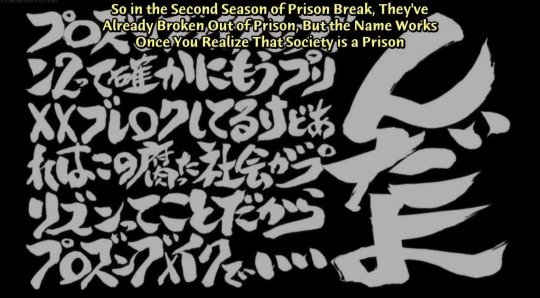
While Yoriko Kuroiwa is imprisoned, this chapter repeats cage imagery again and again. Bujin is in a holding cell, Iwao stands with Furuta in a room adorned with barred windows, the entrance to both Kaneki and Touka’s room has physical bars that they can easily walk in and out of, while Yoriko herself slowly wastes away in the sealed off interrogation room her own execution day set.

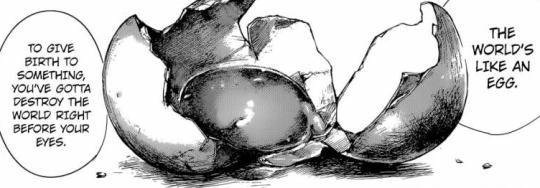
The question is, if the jailbreak arc already happened, if Kaneki supposedly broke his cage and cracked his egg, and if Goat right now is fighting to break the structure of the world then why are all of these characters being shown with clear prisoner imagery?
Perhaps the simpler question is, why are these characters in cages in the first place? Who put them there?
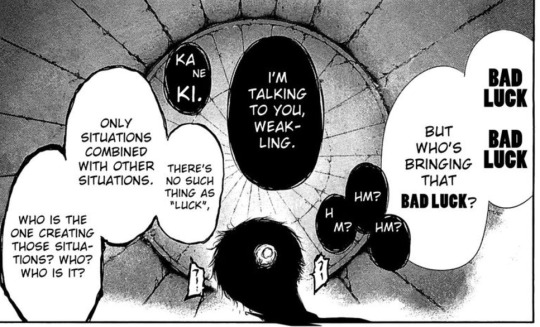
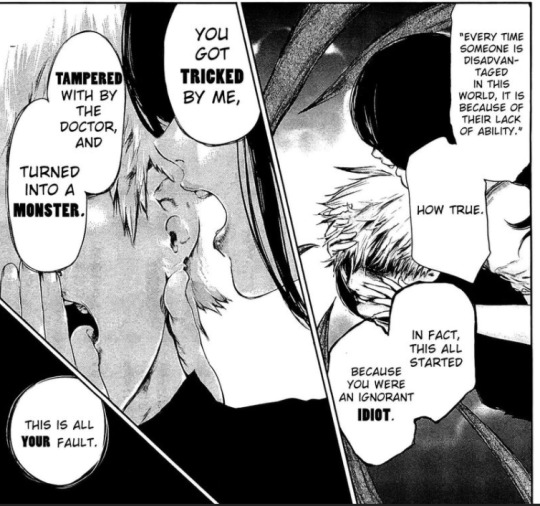
The simplest answer to that question would be society. Especially in a story where V considers themselves to be the orchestrator of the world’s conflicts and resolutions. However, that point of view is reductive as it leaves out the character’s own agency. As long as V has not invented mind control chips, the characters retain the ability to make their own decisions. Perhaps V sets up the circumstances, but the characters still make choices all throughout those circumstances.
Another important but simple observation is that oftentimes in this chapter the characters are shown walking into their own prison cells.

Urie Kuki walks in willingly in order to visit Bujin. Meanwhile it is Bujin himself who was arrested only because of an action he himself did, choosing to punch Mutsuki. Not just because of his association with Yoriko. Both of the men in the cell, are therefore, their one way or another by their own choices.

Urie himself makes an important choice in regards to this situation. He knows that Mutsuki might have some special grudge against either Touka or Yoriko, and has evidence that can corroborate the fact that Mutsuki contrived a statement mainly to frame Yoriko.
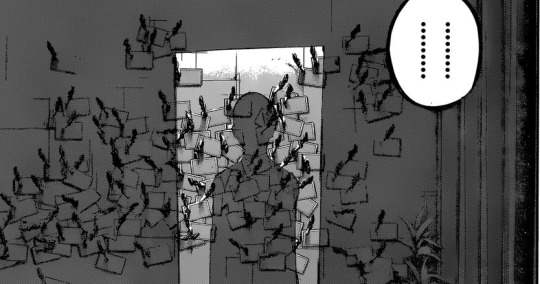
Yet he himself chooses to sit on that knowledge. Perhaps to protect Mutsuki, or perhaps only to protect the image of Mutsuki in his mind as the man who first reached out to him in the auction arc. Saiko too, has evidence of Mutsuki’s transgressions outside of the role of a CCG officer and yet chose not to interfere or even confront Mutsuki about that because of her own fear of losing the family like environment of the Quinx home.

However, Bujin himself chooses to sit and not think of things. After all, Furuta’s whole actions throughout this arc has been to drag the ccg through the mud. A few chapters ago we found him loyally fighting with Furuta’s 100% slaughter operations. However, the fact that humans, or even a human that he’s personally invested in also might be harmed by this new regime is finally something that gets him to call into question? He’s still not empathizing with ghouls or questioning Furuta’s actions, besides the ones that directly affect him.
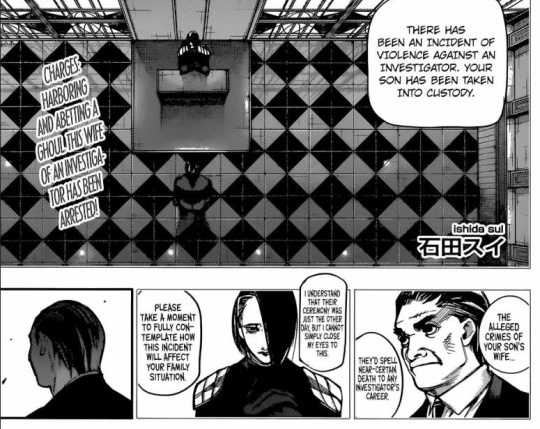
Which extends to the Kuroiwas as a whole. After all, they’ve been profiting all this time as ghoul investigators, by following this strict set of rules and enforcing it. Do they really get to question it now that it’s turned against them? Iwao is offered a choice, his reptutation of a family member. The reputation his family has spent their entire lives, building up and living inside then suddenly becomes a cage to him.
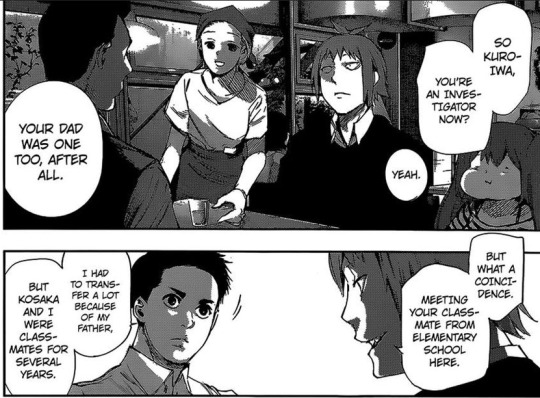
After all up until this point, both Iwao and Bujin have simply chosen to follow the paths laid in front of them without questioning it. Bujin seems to have become an investigator not because he believes in it but because it was what his dad did and that dominated most of his childhood.
Then finally we get to the ghouls underground trapped in a labyrinth of cages by their own will. Choosing to hide and take refuge in the 24th ward rather than fight the CCG directly. This is once again a choice, Kaneki put himself in his own cage by bidding that Goat must flee rather than face the CCG head on.
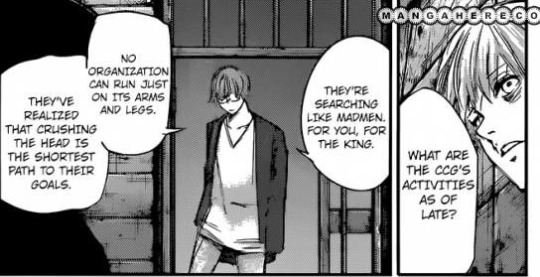

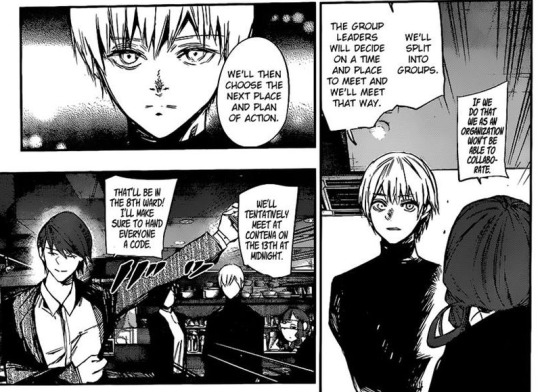
He never chose a next plan of action beyond simply waiting. Perhaps that too comes from Kaneki’s choice, his inability to break the world in front of them. Kaneki sympathizes too much with the CCG and does not want to destroy them the way Eto meant to. Even if they are the ones currently holding the world in the cage. Even before Furuta’s rapid takeover, it seemed Kaneki’s intention was to talk with the Washuu rather than destroy them and root them out. His inability to grasp the situation, his obliviousness, is in itself a choice. After all, Kaneki’s not fighting for the sake of a all ghoul kind as he claims to be. Look at the face he makes when he casually suggests crushing the head of the CCG, even Nishiki is taken aback by a second.

What Nishiki probably has yet to realize is, just as this is to Furuta it’s a game to Kaneki too. This is a game played between two kings who act like children, and refuse to take the conflict seriously. That’s why every move that Furuta makes that seriously jeapordizes Kaneki’s plan, Kaneki refuses to acknowledge and treats just like he lost advantage in chess. The depression of every loss against Furuta just does not hit Kaneki yet, the same way it does the starving ghouls, or even his friends under his own command who have lived their entire lives as ghouls and therefore empathize with the situation of ghouls much more strongly.

This in itself is a choice. Kaneki chooses to acknowledge maybe, but not destroy the parts of his personality that make him resemble Furuta. He accepts the title of king as something he can perpetually cling to in order to give him a reason to live, not something that the lives and deaths of others ride on.
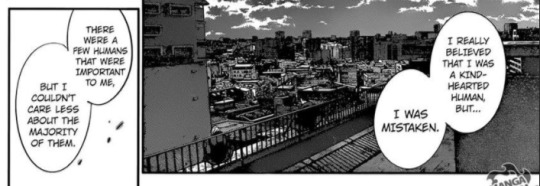
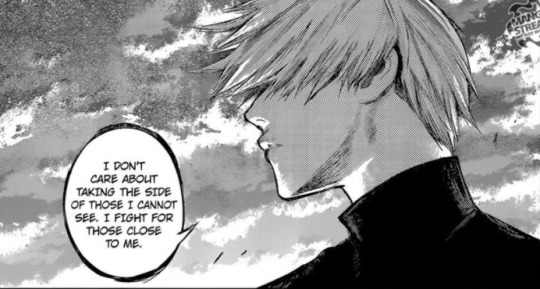

Kaneki’s own continued choice to be passive in every situation even shows in his own relationships. Touka lies to him about being pregnant, he lies to her about Yoriko. Even when he learns the truth about her situation though, Kaneki can barely get through confronting her. His passive attempt ends in failure. Avoiding confrontation, being gripped by the anxiety of losing others, afraid to fight for fear of hurting others, all of Kaneki’s flaws at the center of his being are rising to the surface and dominating both his personal relationships now and also the way he commands Goat. The end result is both of them being trapped down in the 24th ward, unable to truly progress.
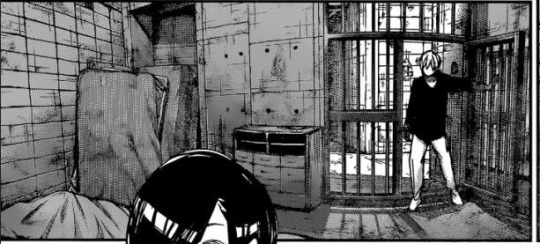
The final example is of course Yoriko herself. What she blames is her own ignorance. That she simply accepted that her happy days with Touka were so simple, and refused to think about her friend’s feelings besides her own personal happiness.
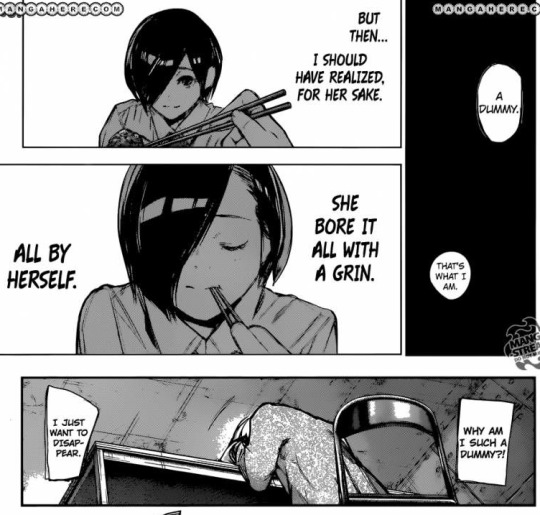
Of course it also takes two to tango, while Yoriko lived in happy ignorance and chose to lie that way, Touka also chose not to tell her the truth about herself. Even when Yoriko was clearly threatened by Mutsuki and put in danger, Touka chose not to interrupt the wedding or try to warn her friend ahead of time. Once again was this chosen for her own safety? or because Yoriko is Touka’s only remaining connection to the human world and Touka feared being rejected by her?
If Touka knows how terrible it felt to be abandoned without a word by Kaneki, why would she subject Yoriko to the same thing? Why would she continue to do so even after Mutsuki was clearly hunting Yoriko and she was in need of a warning not to be blindsided?
All along the way these characters had choices that could have freed themselves just a little from the situation they were trapped in. Yet, all along we see them choose not to take action. That’s because the cage isn’t exactly something that is forced upon them. It’s a cage of their own choosing, and people voluntarily choose to live inside it instead of fighting.
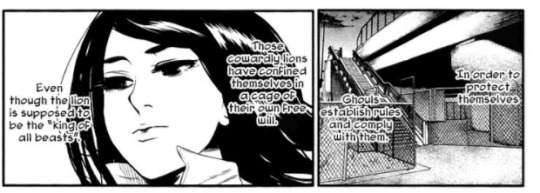
Which is why I really don’t think even if the CCG team up with Kaneki in order to defeat him, that removing it’s head will destroy the will of the rest of the CCG as simply as Kaneki suggests. Perhaps if the cage were that simple and it was something enforced upon all of the investigators present, then removing Furuta would solve everything. This seems even to be a plan that Furuta himself is offering up, and Kaneki is coming around to agree with.

Ghouls and humans come together to crush the head of the CCG, Furuta Nimura is excised and the war between the two species finally ends now that it’s greatest aggravator, and profiteer is gone.

As we’re shown time and time again though, the cage is something entered of one’s free will. In a few chapters ago we were shown, not just the oggai but several main characters still left on the CCG’s side following Furuta’s orders for total extermiantion wholeheartedly. Even if Furuta disapperas, as long as these kind of people remain falling back simply on what’s ordered of them the CCG as a culture will continue to perpetuate.
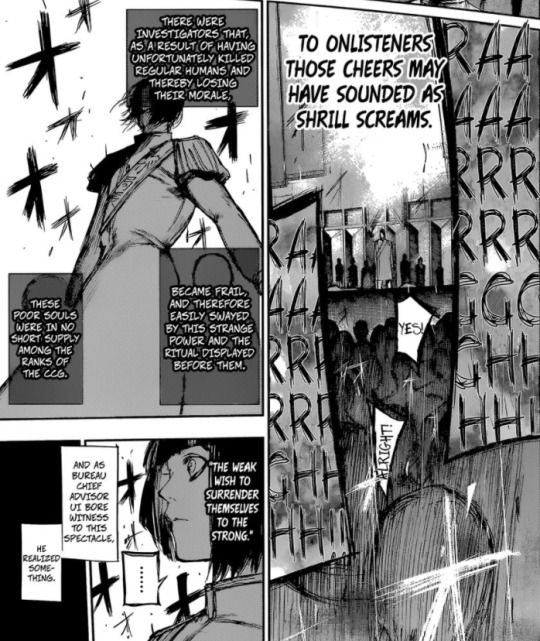
There are reasons people stay in the cage. To everybody it might not seem so restricting, to some it might be a place to belong one that provides comfort.
285 notes
·
View notes
Note
💛- A memory that makes them feel angry
Page walked into the room in his striped, way too small clothes, as if he was on a mission.
‘‘sup.’‘ was all he was greeted with. Just a small acknowledgment of his existence, little more before Sans chugged down some more of his soda.
‘‘…Hi.’’ Page began the treck towards his room, needing to lift his feet high to get over a small mountain of things on the floor, before stopping by the door. Page stood there for a few moments and drew in a deep breath, and turned over to face his brother on the other side of the room. Maybe now was a decent time to talk to his brother.
‘’Sans, when are you going to clean up in here? And I mean, actually, clean up in here?’‘
Crummy made a uncommitting sound and a shrug.
Page tightened his grip around the doorknob, raising his voice more than he meant. ‘'SANS. WHEN ARE YOU GOING TO CLEAN UP IN HERE?’‘
‘‘oof, no need to shout. but i dunno, when i feel like it, i think.’‘
‘‘YOU NEVER FEEL LIKE IT.’‘
‘‘ouch. but eh, is it really needed? the place looks fine.’‘ Crummy said with a shrug and rolled to the side with a yawn, trying to get out of the conversation. ‘’b’sides, my stuff’s important.’’
‘‘Sans, it’s trash. All of it is trash. AND I WANT IT OUT!’‘
‘‘i think you need some glasses because it’s not trash.’‘
Slamming the door shut, he threw his hands over his face, kicking over something on the floor. The things made several soda cans made sound from them on the floor, and a bottle broke into pieces.
Grabbing onto something, Page picked something off the ground, chanting his complaints as he threw things around in fury. ‘’IT’S TRASH!! THRASH, TRASH, TRASH! IT’S ALL TRASH!’’
‘‘and. i respectfully disagree.’‘
—————————————————————————————————
Page was up late at night, his brother was asleep in his room. It was the perfect time to try and clean up the house. Get rid of the trash that had plagued his life for so long now.
Silently he grabbed hold of a bag and picked up some bottles and cans, moving as carefully as he possibly could to not make sounds that would wake up his brother. Crummy always got mad when he tried to clean up while he was awake, but now that he was asleep, Page could do it without worrying about that.
Putting away the bag, he picked up a box and walked with it over to the door so he could place it outdoors, making it spacier in the room, and make it easier to get to the dump in Waterfall when it was needed.
It wasn’t long till Crummy woke up and got out of his room, catching Page in the act. Cleaning up the living room in his attempt to make it livable in there.
‘‘the hell are you doing, papyrus.’‘
‘‘N.NO-’’ Page stopped himself there, trying to remember his volume. ‘’I mean, nothing?’‘
‘‘uh-huh.’‘ taking some quick steps, Crummy got to the door, looking at the display of all of his things outdoors. And Page felt his soul drop, his plan had backfired, and now Crummy knew. But instead of shrinking into himself, he would stand up to his decision, straightening his back and stare his brother down. Knowing what he would get for this.
‘‘why is my stuff outdoors? you don’t just throw away my stuff, papyrus. they’re mine, you know for a reason.’‘
It was only in situations like this he actually ever remembered his brother getting mad at him. Anything else was free game, but touch his things, and Crummy got territorial. Hysteric almost, even.
‘‘I DON’T CARE. IT’S TRASH!!! IT’S NOT STUFF! IT’S TRASH!’‘
‘‘volume, you’ll wake up the neighbors.’‘ Crummy said ‘‘and that ‘trash’ got worth to me.’‘
‘‘I DON’T CARE! I WANT IT OUT! AND I DON’T CARE IF YOU LIKE IT, IT’S NOT WORTH IT!’‘ Page tried to walk through Crummy and out the door so he could continue to clean, but Crummy blocked his path.
‘‘papyrus, go to bed.’‘
‘‘HAHA, I LIKE HOW YOU WANT ME TO DO THAT WHEN I CLEAN YOUR STUFF, YOU NEVER TELL ME TO DO THAT EVER OTHERWISE!’‘
‘‘papyrus, volume. and drop that box, and go to bed.’‘
‘‘NO.’‘
‘‘papyurs, go to bed.’‘
‘‘DON’T BE SO BOSSY, BROTHER.’‘
‘‘papyrus!’‘
—
Was it sad to say, they did that dance several times, over several years? The thought made Page boil, clenching his fists harder the more he thought of it.
His brother was flawed in many ways. But that trash was the worst, it had ruined so much. Why had his brother decided the trash was so important. No matter how much he had pestered his brother. No matter how badly Page’s mental health grew due to that trash.
How withdrawn it had made him. How anxious he had gotten from it, making him unable to be in even slightly messy environments without getting antsy. How obsessively clean he had gotten from it.
How the neglect had made him so angry, and it had lasted till his brother’s death. It never disappeared.
4 notes
·
View notes
Text
Successful Difficult Conversations
5 steps to ensure you get what you want
-Ryan Cairney
In my last post, I wrote about going with your default setting for communication, even when engaging in a difficult conversation. I argued that remaining true to your preferred or default communication style would help reduce some of the already existing stress that you encounter when having this type of conversation. In this post, I’m going to provide you with 5 things you can do to ensure your difficult conversations go as smoothly as possible and yield results for you as a manager or colleague.
As a training professional for a state government agency, difficult conversations is one of the topics I encounter the most. Managers have concerns about engaging in this type of conversation with their employees. There are many reasons for this, including union contracts, the threat of a grievance, and the very nature of government work. It can be a tight rope to walk...unless you work consistently and in conjunction with the human resources staff. If you find yourself in need of having a difficult conversation and you work in a more structured environment, a visit to the HR office is never a bad idea. Walk through the issue(s) you are encountering with your employee and talk about your strategy. HR can help you clarify your thoughts, ensure you are staying “within bounds,” and help you find success with your employee. HR should not be doing the leg work for you. Think of HR as “advise and consent” rather than “getting it done.” HR often plays the spoiler to managers who want to discipline employees, but it’s often the manager who should bear the blame...more on that in a different post.
Before I get into the 5 steps, it’s important to understand why difficult conversations are necessary. If you are considering a difficult conversation, there is clearly an issue. Many managers will avoid engaging in the difficult conversation for fear of upsetting the employee. We do this with our colleagues, friends, and family as well. We want people to be happy and telling them something upsetting flies in the face of that. It’s far easier and more comfortable to tell someone that everything is great than it is to tell them something needs improving upon. However, failure to act and initiate the conversation will only lead to additional issues and it will certainly lead to the issue at hand not getting any better. When there is an issue, there are only three possible outcomes and only one of the three is any good (this should sound familiar if you read our first blog post). See if you can pick out the good option:
Things will get better
Things will get worse
Things will stay the same
Which option did you select as the best possible choice?
So there you have it, you must act. Failure to act means that you are almost certainly assuring that the problem will continue or get worse. Rarely does inaction do much to solve an issue. Some issues may seem to resolve themselves over time, but in reality, the issue is never actually resolved. It’s simply lying dormant, waiting on the next triggering event.
Step 1: Identify and Acknowledge the Issue
It is important to know what the actual problem is. Often, we treat symptoms of problems and not the problem itself. Imagine your knee hurts. You take some ibuprofen and the pain goes away. The next day your knee hurts again. You take more ibuprofen and the pain goes away. A month later, this is still your routine. The pain is going away each day, but yet it returns. You are treating a symptom and not the problem. Until you determine the true problem, your knee pain will return each day.
When identifying the problem, it is also crucial that you determine how the problem is affecting the workplace. Is it affecting performance, morale, customer service, etc.? It’s important to be specific here. When addressing the problem with others, if you are unable to clearly state the problem and how it is adversely affecting the workplace, it will be much more difficult to get consensus during the difficult conversation.
The final part of Step 1 is deciding what your desired outcome is. Are you seeking an increase in output? A change in attitude? Compliance with rules and policies? Again, a failure to be clear and specific will lead to you not getting the results you want. Remember that the only reason to have a difficult conversation is that you are not getting what you want currently. If you fail to clearly state what you want, the employee will not be set up for success.
Step 2: Mental Preparation
Managers who go into difficult conversations without being thoughtful are doomed to fail. The reality of the human condition is that we are flawed and biased creatures. These flaws and biases are not invisible and to the contrary, are often VERY visible to those we are communicating with. Taking the time to be thoughtful will pay off.
Understanding your own biases is a key step in understanding. Harvard University offers the Implicit Association Test that gives users insight to their own inherent biases. Fair warning, the results can be eye-opening. This information is important as knowing where your biases are will help you minimize them. We cannot eliminate bias, but we can certainly take steps to be actively aware of our biases in order to minimize their impact on how we work and communicate with others.
It is also important to consider what is happening in both your world and the employee’s world. Imagine you need to have a conversation with an employee, but they were in a car accident on the way to work. Are they going to be in the best frame of mind to hear what you are saying? Probably not. Did you just give the employee a glowing performance review? How will they react if after getting this great review, you haul them into your office to discuss a performance problem? Think about the background, world, and optics of the conversation. Remember, the goal is to get what you want. As my father would say (and please don’t tell him I’m using his material - teenage Ryan would never forgive me), set yourself up for success. It is not a matter of who is right and who is wrong, but rather a question of success. You want something from this person, so do what you need to do in order to get it while doing what you can to maintain or improve the good relationship. “Do it my way because I’m the boss” will likely work in the short-term, but be prepared for future issues.
Lastly, it’s important to do a quick review of your emotional triggers. What are the things the employee could say or do that would throw you off your game? Do they blame others, fail to take responsibility, become agitated, etc. Take a few minutes to go through each of these scenarios and be thoughtful about how you will respond. This will help you remain calm and focused during the conversation.
Step 3: Schedule the Difficult Conversation
This is one of the most overlooked steps in the process. Managers stop by the employee’s workspace or send an email. Email is probably the worst way to engage in a difficult conversation with an employee. There are several reasons for this:
You give up control of the message
Email doesn’t allow for context or tone
Email is impersonal
There is no chance for an actual conversation
You lose the ability to create a comfortable environment
You lose the ability to read the reactions of the person you are communicating with
This is not an exhaustive list, but you get the idea. Email is great for a follow-up to the conversation and for restating what was said in the room. But it should absolutely not be the first step in the process.
It’s also important to consider the type of employee you have. If an employee does not react well to potentially bad news, a bit of prep work might be prudent. Talk to the employee and let them know you are putting some time on their calendar for a discussion. This will give them time to mentally prepare themselves. If you have an employee who is more comfortable with direct communication, this step may not be necessary. Ideally, you know your employees and their style. Use that knowledge to your advantage. Again...set yourself (and the employee) up for success. Refrain from scheduling a difficult conversation for 4pm on a Friday. Refrain from sending the meeting notice during the same time. Consider the employee’s feelings and try to see the situation from their point of view. They will certainly appreciate your efforts here, even if they go unseen.
When scheduling the meeting, think about how and when it will take place. Is a crowded area where others can see and hear the best choice? Do you have a private meeting space? Would an off-site meeting be best? What time of day are you and the employee at your best? If the employee is not a morning person, perhaps consider scheduling the meeting in the afternoon. Again, use the information and resources you have to help you and the employee find success.
Step 4: The Meeting
Before we get into this step, let’s do a quick review. Have you:
Identified the core issue along with how it is adversely affecting the workplace?
Taken the time to understand your biases, flaws, and triggers?
Scheduled a time to talk?
Now that we have those items settled, it’s time to actually have the conversation. Take a moment to breathe and collect yourself before the meeting. Clear your head of distractions and focus solely on the conversation you are about to have. Begin the conversation by welcoming the employee to the space and thanking them for their time. Employees often feel undervalued in terms of time, so start off right by acknowledging that this conversation is possibly an interruption into work that you yourself have assigned them.
Begin the conversation by clearly stating the issue at hand and how it is affecting the workplace. Do not mince words here, be clear and concise. A warm or kind tone is advisable, but “beating around the bush” will only make the conversation more challenging and might lead to both parties becoming frustrated. Even worse, failure to be clear might lead to the employee misunderstanding the problem altogether.
After you have laid everything out, give the employee chance to respond. Take notes while they speak. Let them know you are taking notes so that the items discussed will be maintained. Let them know you want to be able to focus on the conversation and not trying to memorize everything said. Finally, inform them that you want to make sure what they said is accurately recorded. Not as a “gotcha,” but rather a formal and factual account of the conversation. This is as much for their benefit as yours. Once they have finished speaking, say something like “ok, I want to recap what you said to make sure I understand where you are coming from.” Then, using your notes, recap what the employee said. Ask them if you have it right. This gives them the chance to correct any misstatements or misunderstandings. This two-way communication creates an open environment where both parties will feel heard, and more importantly, understood.
At the conclusion of the conversation, do another recap. Discuss the action steps that the employee will take. This will be the action plan that the employee can follow. Managers must give employees a roadmap to success. Give the employee specific things they can do to achieve the results you want. Inform the employee that you will send a follow up via email along with the action plan. Asking for agreement on the action plan is a nice step, but it’s not always possible depending on the temperature in the room. Acceptance though, is required. As long as the employee accepts that the steps in the action plan are good for all parties, you have had a successful difficult conversation.
During some difficult conversations, you may need to either pause or stop the conversation completely. If this happens, it’s important to state what is going on. Let the employee know that temperatures are rising and you feel it would be best to pause and schedule another time to talk. Acknowledge what is happening. Pretending that no one is upset only serves to invalidate how either your or the employee are feeling. Some examples of situations where the conversation needs to be stopped:
Either you or the employee are becoming overly emotional
You feel unsafe
The conversation is becoming argumentative
Either you or the employee are repeating statements frequently
Step 5: The Follow-Up
Following up after the conversation allows you to recap everything that you discussed during the conversation. Emotions will undoubtedly be part of most difficult conversations, and that’s ok. Following up in a written format allows the emotion to be removed from the factual parts of the discussion. This is where you are able to restate what was said and review the action plan. It also gives you an opportunity to let the employee know what the next steps are. Are you following up in two weeks? A month? Let the employee know when to expect the next part of the conversation and what your expectations are for them in between.
After the follow up, do a self-assessment. Did you do a good job? Did you say everything you wanted to say? Did the employee react well (or as well as can be expected)? Is the employee open to the steps in the action plan? Do you think the conversation was successful and will lead to an improvement in your work area? Review these notes before your next difficult conversation with this or any person.
In conclusion, following the steps above will help create an atmosphere of trust and collaboration between you and your employee. These steps are not exclusive for managers, try them at home or with a colleague. You’ll find that by setting yourself up for success, you’ll have a much easier time getting what you want.
Successful Difficult Conversations is one of the many workshop offerings from RM Experience. To learn more or to schedule a workshop, please contact us via Twitter or email (see below).
I’d love to hear from you! Comments, suggestions, outright disagreement are all welcome. Follow me and Molly on Twitter (@rmexperience) to continue the conversation. You can also email us at [email protected]. We post new content weekly, so come back often!
0 notes
Text
10 Ways to Stay Motivated at Work

We all live hectic lives with each one people having a certain collection of jobs as well as obligations to deal with each day. Daily, we are taken in by our demanding schedules so much to ensure that we have a tendency to ignore particular aspects of your inspiration as well as your total productivity. The only factor sustaining your drive to carry out well day-to-day is regular tendencies as well as the need to obtain points done in time. Nevertheless, every once in a while, all of us run into days when we are not feeling our most effective selves. We guarantee ourselves that we will get something done yet you never really end up completing it merely because we cannot obtain ourselves to benefit it. Whatever is on our checklist that day often tends to get ignored or delayed to another day as well as time.
Why people feel demotivated
Ever wonder why one also feels demotivated?
Downhearted method: A pessimistic viewpoint is a typical finding in those who are really feeling demotivated as they locate their chances of success to be rather slim which subsequently quickly results in a reduced level of self-efficacy. Unknown goals: Their vision is often clouded by the battle that exists ahead of them and stops working to acknowledge the prize at the end that makes them seem like there is no factor functioning towards a certain goal. Impractical assumptions: Castle in the airs are usually incorrect to enhance the drive to work harder, yet in fact, it is reported to have actually caused extra injury than good. It is in fact far better to establish smaller sized and also extra realistic goals and job in the direction of them to make sure that you have something to celebrate. Failing to confiscate opportunities: Falling short to recognize the opportunities that depend on front of you likewise is also responsible for conjuring up a feeling of dejection as well as failing and also therefore, demotivation. Quick-tempered strategy: Success does not come very easy as it is a sluggish procedure. Going for immediate outcomes and also stopping working to accomplish them invokes a sense of failing as they have a tendency to get sidetracked by points going on around them as opposed to themselves. Blame game: Playing the blame game is the very best method to go about it. Blaming others for your drawbacks as well as declining where they are incorrect is another reason individuals feel demotivated. Poor time monitoring skills: Time monitoring is crucial if you are to obtain things done. Wasting time doing unnecessary points constantly leaves you with no time for the work that needs to be done that makes one assume that the job is a challenging one. The result of this leads to procrastination. Self-doubt: Doubting one's skill and abilities is another essential variable as it cripples an individual from exploring their real possibility. They are often sidetracked by their environments as well as have an unhealthy tendency of comparing themselves with those that they see on social media. Without knowing their very own selves, they tend to assume that they are unsatisfactory to execute a job that another person did. This is a rather common finding among teenagers, young adults along with the senior. Self-doubt is actually thought to be one of the indications of dementia, specifically blended mental deterioration.
Ways you can stay motivated at work
So just how does one stay motivated at work?
See the bigger picture: Zooming out as well as taking a look at the bigger photo provides you a much-needed perspective to understand why you are operating in the first place: to achieve a certain objective. The big picture will certainly assist you make sense of your purpose as well as the significance of the job at hand. As soon as you understand where your priorities exist, you understand what to work for. Prevent laziness: Easier claimed than done, yes, yet there are ways you can avoid procrastinating. If a job is typically assumed to be challenging, uninteresting, frustrating, amorphous, as well as uncertain or lacks any kind of meaning, there is a high opportunity that you will certainly wind up procrastinating. However, once you recognize the task's value, you will right away find yourself combating to be as efficient as you can be. Self-pep talk: When in difficult situations where we find ourselves battling to conquer the easiest of jobs, we tend to connect with ourselves and also persuade ourselves that we are unable of completing a task. Self-talk is the best way to either press you to do much better or quit you from attempting altogether. Avoid the adverse self-talk and start speaking about the positives. The even more you encourage yourself that you are capable of doing anything and every little thing, the simpler it will be for you to push on your own to be effective. Take responsibility if you did a negative work: No one is perfect, as well as it is okay if you screw up from time to time. A guy picks up from his mistakes so take every poor report as a knowing lesson as well as move on. Minimize your work: On days when you are not feeling your best efficient self, do not overburden on your own with the obligation of ending up all your operate in one day. In fact, reduced your workload and also only designate a tiny portion of the originally determined job and also work towards accomplishing that. Overwhelming your mind will certainly bring you no great and also just induce extra panic as well as stress. Set deadlines: Target dates are difficult, yet they are the most effective method to get you to hustle as you find on your own pressing to pack as long as you can because restricted quantity of time. Modify your surroundings: Usually the factor behind our indifferent approach is just the lack of adjustment. To be much more productive, an attempted and also tested a means to obtain you back in the area is by changing your setting as well as transforming your job setup. A change is constantly refreshing and also inspiring therefore instigating you to perform well. Restricted web: Cut on your own away from the toxic leech that is social media sites as well as the internet. It is a sidetracking area where we have a tendency to waste hours on utter rubbish and also the following thing we know, we run out time. Separating from the web is a sure-fire method of being more efficient. Set incentives on your own: Call it a kickback or a reward, yet if you offer on your own the deluxe to enjoy something after completing a specific job, you will find on your own functioning towards that benefit and also finishing the task available. Welcome your flaws: It serves to be ineffective as well as really feel demotivated. Not really feeling up to the mark is usually an excellent sign for your requirement to renew as well as recharge rather than pushing yourself every day. Find out to approve your problems and also drawbacks. Take a break if you have to and also give on your own time to recharge. Breaks assist productivity due to the fact that your mind obtains that much required cleanse from all the noise as well as commotion and enables you to assume clearly. With a clear mind and also focus, you can relocate hills. Really feeling demotivated is not unheard of phenomenon. In this day as well as age where the survivor just lives to grow and do well, there are instances when you seem like you have actually shed your side as well as are just not urged to do any solid work. There is always greater than one way to get yourself back right into the work and also transform an unproductive day around quickly.
0 notes
Photo






Correctional Peace Officer, Writer, Activist, San Francisco
I was driving down the mountain in a 4x4, alone and on a road so bumpy it felt like off-roading. Basically I was off-roading on the Haleakala mountain, but I didn't even notice. I was listening to a podcast where a woman was pouring her heart out, and I heard her. Her struggles, brutal honesty and feelings of despair and triumph. And the more I listened the more I wanted to understand her story and interview her. Several searches, tweets, messages and I was sitting across from Ms. Hauwert in San Francisco, eating fish and chips. She had a day off from working as a first transgender correctional officer in San Quentin State prison and I was honoured that she decided to spend couple of hours with me. Opened in July 1852, San Quentin is the oldest prison in California with population of about 3,774 as of December '16. The state's only death row for male inmates, the largest in the United States, is located at the prison. I had so many questions and I was also intimidated to meet a person who handles herself so well among population of mostly men, in a tough environment. I did not need to worry because Mandi in person was even more lovely, kind and warm than the woman I heard over the speakers. Below is the very honest and unapologetic q/a where I learned something and was left with at least 100 more questions. 1. Name Mandi Camille Hauwert 2. Where is your hometown? Port Hueneme, California 3. What is your profession/career/title? Correctional Peace Officer—Writer 4. I first heard you talk about your journey / transitioning on a podcast interview where you describe the difficulties in personal and professional life. Can you describe what are some of the differences between feeling acceptance in your personal and professional sphere (at home vs. at work)? I believe that acceptance is vital to a successful transition. In my life, I am both a transgender woman and a peace officer; yet, within each of those environments, I am somewhat of an outcast. Inside the prison system, social progress is stifled. They remain decades behind the societies in which they reside. Racism, sexism, and homophobia find a home here—not that recent political events in the USA haven’t uncovered many of the same rampant forms of bigotry prevalent in our culture. It is no surprise that those working inside the justice system would find the idea of a transgender woman to be unnerving. The outside world is, only recently, coming to terms with the existence of transgender people. It is as if they are being told that the world they thought they knew, is no more; in fact, it never was. To my trans-family, being in law enforcement is either the most heroic thing that I can do, or it makes me a traitor to our cause. I have become an oppressor, in their eyes. It is an incredibly isolating experience to work in an environment where you are always fighting to gain acknowledgment. To better the very system you find yourself in. In the interim, you have to defend that career choice to those in the transgender community who, quite frankly, have every right to question and be wary of anyone who would call themselves an officer of the law. I am not hated by every co-worker, just as I am not hated by every transgender person; however, it is for those who would throw me to the very depths of hell itself, that I continue along my path to bettering myself and my world. I am most fortunate to be in a position where I can even begin to make those changes, to a brighter, more inclusive society. 5. Biggest feeling of accomplishment since making the decision to transition? My most significant accomplishment—thus far—would have to be the four and a half years I spent working toward gaining the acceptance of my parents. Going from, “You killed our son.” to, “This is our Daughter, Mandi.” My parents have made a substantial transition, perhaps more than my own. They had to come to terms with the idea that they were not losing a son; but, gaining a daughter. That I was still their child—their miracle baby. 6. What are the challenges you face as a female managing men and what has helped you to overcome those challenges? It was kind of interesting to see how the inmates reacted to me as a male versus a female officer. For one, they tend toward softer more calming voices—I learned later that it’s their attempt at flirting indirectly. I struggle, now, to have men take my authority seriously—in just about everything. I don’t think they notice; but, they explain things to me now, things, I already know—better than them usually. Although, I will say that I am not treated as a woman by all. To some, I am that “tranny.” A sideshow attraction. To overcome or deal with many of my newfound problems, I looked to other female officers. I asked odd questions, like how to ward off unwanted male attention, or how to survive when you’re awash in a sea of testosterone and male aggression. Most people I think forget, I was never a man—at least not from my perspective—and though I’ve always been a woman, I have not always been treated as one. In other words, I had a lot to learn about being a woman in a male-dominated workplace; I am still learning. 7. What are some stereotypes about your line of work that are true and which are unfair (not true)? Stereotypes are a funny thing; often they can be alarmingly close to reality—others—they miss the mark entirely. The problem with stereotypes is grouping. When they get applied to an entire sub-group of people as being immutable facts or qualities. For example, when many people think of correctional officers—prison guards—they’re imagining something akin to the guards in The Shawshank Redemption; lumbering knuckle draggers who revel in inflicting pain and suffering upon another human being they see as scum. Do these type of guards exist? Absolutely; however, in today’s modern prison system, those sorts of individual quickly go from wearing a badge to dressing in a prison jumpsuit. My experience of most correctional officers is they tend toward conservative viewpoints, chauvinism, and a strong sense of justice. Like all of us, they are flawed; they have qualities which are not best suited for working in prison. Yet, for balance, we need all sorts. I am a communicator; I talk my way out of bad situation. But, there are situations where talking just isn’t going to work, where a harder approach is warranted. As an officer, my job is to ensure the safety of those in my charge and to make sure that the will of the people, through the courts, is carried out—namely, that those sentenced to incarceration, serve out their time. I was not hired to make their lives a living hell or to pass judgment upon them. 8. What was the biggest disappointment and plan to overcome it? I’m assuming you’re referring to my biggest disappointment since transitioning. For me, it has to be my potential as a writer. I’ve had some success, and writing about my journey has given me so much to write about; yet, I remain blocked somehow. There are barriers that I seem unable to defeat. Really, it is the desire to contribute something of significance to the transgender movement—more than simply coming out at San Quentin. While that is indeed an accomplishment worthy of attention (ahh—so egotistical), it does not feel quite right. I have more to offer; I am more than an intriguing headline. A talent that I have been fostering my whole life has been my writing. I make no particular claim as to the brilliance or ingenuity of my prose; but, it is all that I know, all that I am, and all that I have to give. 9. Advice for other men looking to transition (related to thriving as a transgender woman) and Advice for other women (trans and not) who may be looking to enter your line of work? First I need to address the usage of language in the question itself; I would be derelict in my duties as a trans advocate if I did not. When you ask about advice for transgender women—referring to them as other men—I understand the confusion in pronoun usage; after all, before transitioning, they are typically living and presenting as men. Yet, I would advise any individual, writing in the transgender sphere, to avoid using the assumed pronouns of the trans person(s) in question—unless it is absolutely vital to tell the story. It would be the same for transgender men—not referring to them as other women. Sorry—preaching. For those who may or may not be transgender, looking to enter into corrections, I would first ask—do you have any other options? Kidding aside (Am I?), Working as an officer in prison is, tedious, stressful, and dangerous. We need all sorts of personalities wearing a badge; diversity in policing is incredibly important in creating a better environment for all—or at least as good as a prison can be. Be prepared to see things that may disturb you, frighten you, or shake you to your core. And if any of that sounds ominous, then corrections is not for you. Remember, those in our care are human beings and deserve respect afforded to that title. If you cannot separate your personal feelings toward their crimes—and do your job—then you will struggle. We are not here to be their friends; but, neither are we here to be their tormentors. And to the transgender hopefuls, know, that things are still improving; the department of corrections has a few miles to go yet. If you can, transition before you apply. If you come into your own while wearing the uniform, I can only hope that your experience is better than mine and those who’ve come before. We are here—I am here; should you need to reach out for advice or a friendly ear, I am always willing to listen. 10. Where in the world do you feel “tallest” (i.e. where is your happy place)? My happy place, is not so much a place, as it is an activity—writing. Specifically, scribbling in my notebook with a good’ole pen or pencil. With a piece of paper, I am God. I hold the fate of each blank page in my hand. Before me is infinite possibility waiting for my thoughts to give it form and purpose. Even the act of regarding the beauty of a blank page gives me satisfaction. With a pen and a piece of paper, I can control the fate of my deepest, darkest, thoughts; my heart tore open upon the page for others to read, to ponder, and perhaps—to learn. 11. What extra-curricular activities/hobbies are you most proud of? Why? I’ve had so many hobbies, it is hard to know what to chose. Learning martial arts rates high on my list of activities I’m most proud of. However, my reasoning for taking it on in the first place has to do with my childhood. I used to get picked on and beat up. The worst of which happened during shower time after P.E. I wasn’t comfortable undressing in front of boys—I am a girl—and that made me weird, and outcast. And around junior high, I began to notice my attraction to males; the bullies too, noticed me, noticing boys. I was the target of regular beatings, usually while kids yelled homophobic epithets. It was a kid on the playground that saved me one day; literally sailing over my prone form and kicking my assailant. It was his intervention and the knowledge that he possessed such knowledge thanks to the study of martial art, that moved me to seek training. In the years that followed, I gained a Sandan (third-degree black belt) in Shorin-Ryu and a high rank in Wing Chun Gung Fu. Over 20 years of hard work and long days punching and kicking—all so I could walk through life without being in fear of my life. I’m not too shabby at Close-up Card Magic either. 12. What is the future goal/challenge (career and/or life goals in 5-10 years)? I’ve always said, that at my ten-year mark with corrections, I’ll promote; I am well on track to that goal. My ultimate career goal, however, has to be living and working as a writer, and author. I love it. Toward that goal, I have made progress, and I need to continue pushing forward. Perhaps a biography is in my future—though I love writing the stories of other trans people as well. 13. What fears are you still hoping to overcome? I want to, desperately, overcome my fear of living. For decades, I’ve suffered from depression. In fact, I couldn't say for sure whether or not I’ve ever been happy. Having to deal with Gender Dysphoria and all of the fears that come with it, have left me spent. While my darker emotions come quickly, I find it hard to connect to the brighter side of my psyche. I have—and continue to—suffer from suicidal thoughts and ideations. I am a survivor of more than a few attempts. More than anything, I want—need—those self-harming thoughts to stop. The scariest part of it all is that I have no idea—short of medicating myself into oblivion—about how to end this deadly cycle. 14. Anything you'd do differently (if you had another go at life)? Can I be born a girl? If not then —no. The reason? There is no guarantee that my life would have been any better today, had I come out at a young age. During the 80’s and the 90’s, the treatment for transgender people was shock therapy. They’d literally attach electric contacts to your skull and turn up the juice. Besides, I wouldn’t have the opportunity to do many of the things I’m doing today—like making history as the first openly transgender correctional officer at San Quentin. (ps…I was born a girl; I just didn’t tell anybody right away.) 15. What inspires you? The unending creativity of the human mind gives me hope for the future; I draw from its wellspring to turn the void into being. It is from the example set by my progenitors that I draw my inspiration. 16. What are you hopeful about? Hope is a fickle friend for me. I sometimes feel that the more I hope something, the further it races from my grasp. If there is hope in me, it would have to be for the bright future of our young transgender family. 17. What are you reading now? (what books do you gift most and what are your favorite reads?) I mostly read non-fiction—science, psychology, and philosophy. I do love Douglas Adams and Terry Pratchett as my go to fiction authors. The book I’ve gifted most—even going to the store to buy new copies just to give away—is Gavin-De Becker’s The Gift of Fear. Mostly it teaches people to trust their instincts in dangerous situations; that we often notice more about the world around us than we give ourselves credit for. 18. Who is a “WOW Woman” in your life who inspires you (and why)? Perhaps it’s cliché; but, my WOW woman is my mother. She has overcome so much in her life and still managed to raise loving, caring, and compassionate children. I would say more about her story; however, I do not want to tell it, until she is ready for the world to hear it. She is far from perfect; she has flaws which I would never admonish; though I have yet to run across a better woman to look toward, to show me what a woman is—a decent person. 19. Where can others find you/your work (links to websites, blogs, etc.)? My HuffPost Blog
3 notes
·
View notes
Text
Foundation of Sand
or “Why the Marxian view of socialism and communism was inevitably flawed due to a contraction and lack of solid foundation, dooming the ideology.”
The ideology of Marxism, though largely associated with certain sorts of dictatorial, explicitly authoritarian states and organizations in the 20th and 21st centuries, in reality was never intended by its creator (or creators, in as much as one must count Engels as an important associate in the formation of Marxist theory) to result in dictatorial control. Indeed, quite the opposite, the entire concept of the vanguard party was explicitly opposed by Marx, though not necessarily the use of violence.
In Marx’ view, what was going to happen was that the proletariat would increasingly use “democratic” and legal means to gain power and control, which was the actual intended meaning of the term “dictatorship of the proletariat,” not a literal centralized dictatorship, but rather a collective one of the working class, which would eventually lead to a socialized society and the atrophy of the state, until it became unnecessary and communism was established.
This required, of course, the transformation of humanity into a sort that could do this, which is one of the major flaws of Marx’ doctrines in general, in that they posit that human nature can be changed, because it does not actually exist. That is one of the parts of the foundation of Marx that was clearly made of sand; it lacked any stability. However, there was a fundamental other aspect Marx and Engel ignored.
In their writings, they acknowledged the coercive nature of government, but saw this as a necessary thing in the revolution that was to come. It must be understood that they did not use revolution in the way it has come to be meant, due to the acts of later individuals and ideologues such as Lenin, but rather in the sense of a transformation of society. The idea that society would democratically adopt and become socialist and eventually communist, however, had two major issues.
First, they at no time actually managed to explain how this socialist society would be organized or how it even could be organized, indeed they explicitly chose not to do so, because of the idea they would be unable to do so due to their lack of knowledge of what the conditions of the future would be in a given society. Even their Communist Manifesto was more a Communist Manifest, in the sense it was more a document listing the details and cargo of the ship they wanted to sail, rather than an even cursory examination of how that ship was to be launched, sailed, or guided to its destination.
Secondly, and more importantly, they ignored the inevitable end, though, of this acceptation of coercive means. Given they explicitly chose not to reject violence, and indeed repeatedly even defended and endorsed more explicit examples, this is imminently notable. Indeed, logically, the government is itself an agent of violence, indeed it is the monopoly on its use in a given region. That some states may franchise out this monopoly is nothing more than a recognition of it, IE: that a government may allow an individual to engage in violence, be it against another person or in defense of self, and grant sanction, that the government even exercises such a power at all is a concession to the idea they have that monopoly.
The first of these meant that any supposed society they envisioned to come into existence was a nebulous affair, with no logical explainable of how it was to be run. This is hardly practical, let alone actionable. This is not merely to say all those who complain of a thing must have a solution to that which they call out as wrong, but Marxism was predicated on more than that, it was a complaint of a situation (which, notably, Marx was ill informed about anyway,) and a desired replacement, with no real effort spent on how to get form one point to another or effort put in to explaining how that system would be actually organized or run.
The second, and more dire still, was that a failure to recognize that the wrong means cannot achieve the right ends on the basic level, but even more that their embrace of coercive and violent acts in one area justified their uses in other areas, as they had no way to argue without being merely arbitrary that some forms of coercion or aggressive violence were somehow invalid while others were valid.
Further, while it has been inaccurately said (by me, even, in earlier mistakes) that Marx elevated the worker, or rather, the proletariat to some sort of moral superiority or higher status, the truth was nothing of the sort. Indeed, Marx actually wrote of the opposite, which only makes the error the greater ironically, in that Marx somehow expected a system of class domination by a class he himself did not believe was any superior in morality or substance to the bourgeoisie or capitalist class as he envisioned them to act in a manner that would produce a better society. Of course, this is part of his general denial of human nature, and an essential reflection of a view that humans were products of their environment entirely, including their economic environment.
Thus, taken all together, the foundation (or lack there of) for Marxism is its inevitable doom. In some ways, the social democrats reflect some aspects of Marxism better than the more radicals, and certainly more than any Anarcho-Communist, yet the inevitably failure of democracy and indeed the implicit violence in the democracy as it is actually exercised dooms the entire endeavor, as the evident truth that it implicitly not merely sanctions, but encourages class warfare and domination.
A house divided against itself cannot stand. Of course, few ask if the house should stand at all.
This, of course, does not even touch on his personal inconsistencies, in that his supposed writings about democracy and opposition to dictatorial means were in stark contrast to his actual behavior, which was profoundly anti-democratic and dictatorial; despite decrying the concept of small vanguard of intellectuals driving the movement, he seemed pressed to be that very vanguard and drive things as he wished. This is, however, a topic for another time.
1 note
·
View note